











The Gautrain is not just a transport project, it is an economic development project focusing on reaching objectives of stimulating economic growth and job creation, promoting investment and new development.


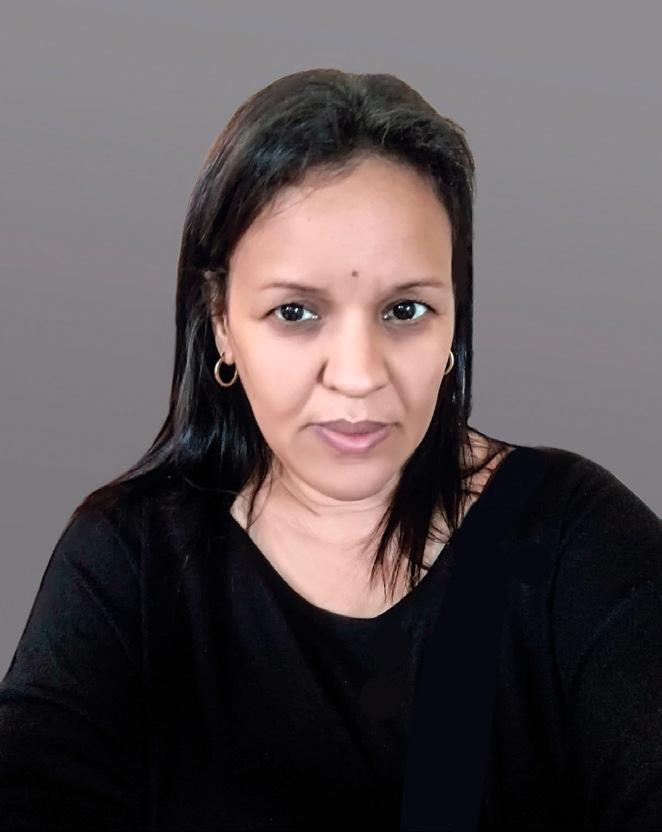
The year 2024 represents a critical milestone in the country’s history, as it reflects and celebrates 30 years of SA’s democratic dispensation.
Many reading this issue have witnessed South Africa reimagined after coming out of the clutches of the old apartheid regime, and part of our journey of reflection requires that while we understand that South Africa today is completely different from the South Africa of 1994, we still have a long way to go until we “have created a society which recognises that all people are born equal, with each entitled in equal measure to life, liberty, prosperity, human rights and good governance,” as Nelson Mandela once said.
In these critical times it is important that we have visionary leadership, with the
power to implement that vision. With this in mind, our Front Cover Feature focuses on Gauteng CoGTA, that under the sterling leadership of MEC Mzi Khumalo, is addressing the pressured ageing infrastructure in what is the most populous province in the country, while navigating the ever-changing landscape of coalition governments.
The new Mayor of the City of Ekurhuleni, Nkosindiphile Doctor Xhakaza, who leads a coalition, made his inaugural SOCA in April and we can get to know more about him and the City’s priorities in the Municipal News section.
It is easy to trivialize the hard-earned gains of our young democracy when we are witnessing the current housing challenges, but along the way we have had much progress. To address the

growing population's needs in the City of Tshwane, Housing Company Tshwane CEO, Obakeng Nyundu, recently launched the much lauded Townlands Housing Project in Marabastad that will bring relief to 1200 low-income families.
Our focus on Youth Month showcases The Learning Trust as a beacon of hope for young learners, bridging educational gaps and unlocking the potential of SA’s future leaders, while the visionary Garden Route Skills Mecca Programme is on track to transform the region into a hub of skills development for specific skills and expertise endemic to the Garden Route.
In the past few months the Electoral Commission has kept us all updated on the country’s readiness to conduct the 2024 National and Provincial Elections, and has always committed to pronounce an election outcome rooted in the choices of the South African voters. It now becomes our prerogative to ensure that our voice is heard. Our vote counts.
As Electoral Commission CEO, Sy Mamabolo says: It’s your democracy, own it.”
Enjoy the read and keep safe!

• Service delivery
• Reputation & credibility
• Ethical practices
• Audit outcomes
• Risk identification & mitigation
• Management
• Accountability
• Employees are highly skilled & competent professionals through up-skilling
• A robust ethical approach

• Stronger stakeholder relationships
• Efficient & economic ways of working
• A competitive edge
• Full control through performance measurement
• Costs
• Wastage
• Complexity
Assisting Local Government and Municipalities to strengthen their Procurement & Supply Chains and help deliver better services to communities. Now is the time.
Email saenquiries@cips.org.za to find out more.










54 NRCS - Continues to play a pivotal role in shaping the future
56 SCHNEIDER ELECTRIC FOUNDATION Turns 25 and launches the '25 Years Young' campaign
58 SANTAM - Partnership for risk and resilience (P4RR)
62 THE LEARNING TRUST - Empowering learners, transforming communities
64 METPAC-SA - Leading the charge towards sustainable metal packaging
68 STATS SA - Tracking the municipal rollout of alternative energy sources
NEWS
74 City of Ekurhuleni
77 Mossel Bay
78 Garden Route District Municipality
80 King Cetshwayo District Municipality
81 City of Mbombela

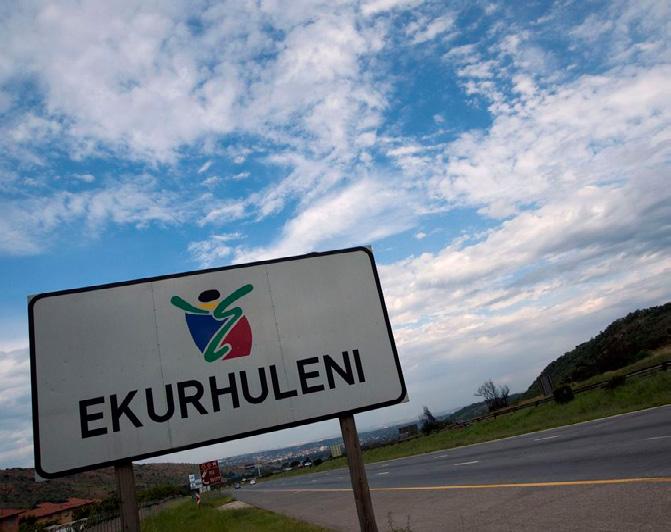







“Communications, Marketing and Advertising are indispensable tools towards success and growth in any business venture…”
“Communications, Marketing and Advertising are indispensable tools towards success and growth in any business venture…”
Kweda Media & Communications offers a diverse range of business and sales solutions, strategies and ideas that are customised to meet our clients’ standards and exceed their expectations.
Kweda Media & Communications offers a diverse range of business and sales solutions, strategies and ideas that are customised to meet our clients’ standards and exceed their expectations.
Our Vision is driven by the passion to inspire, assist and elevate business enterprises by forming strategic collaborations that will yield multiple benefits of success and growth for all.
Our Vision is driven by the passion to inspire, assist and elevate business enterprises by forming strategic collaborations that will yield multiple benefits of success and growth for all.
Kweda Media and Communications is a Proudly South African, 100% black female owned company located in Plumstead, Cape Town, registered as a private company since May 2014 - we hold a level 1 B-BBEE certificate. We are a team of multi skilled staff members who have a fresh, innovative and diverse approach to working and always willing to put in the extra time and attention to ensure great service delivery on time.
Kweda Media and Communications is a Proudly South African, 100% black female owned company located in Plumstead, Cape Town, registered as a private company since May 2014 - we hold a level 1 B-BBEE certificate. We are a team of multi skilled staff members who have a fresh, innovative and diverse approach to working and always willing to put in the extra time and attention to ensure great service delivery on time.
Your vision… our drive
Your vision… our drive











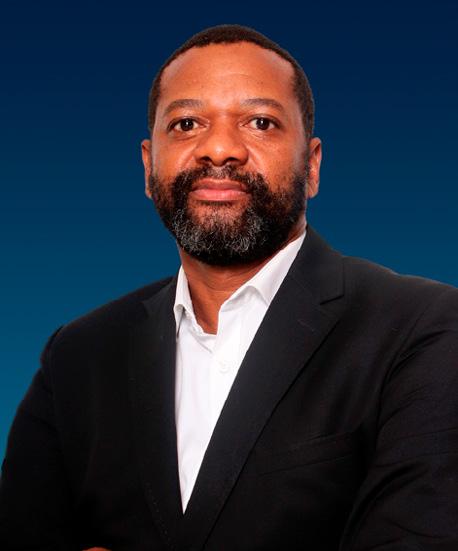
SIMO MKHIZE
SIMO MKHIZE
SITHOLE MBANGA CEO:
CITIES NETWORK
SITHOLE MBANGA CEO: SA CITIES NETWORK MEC: Mzikayifane Khumalo
EDITOR
PUBLISHING EDITOR
PUBLISHING EDITOR
DISTRIBUTION
DISTRIBUTION
Nardine Nelson nardine@kwedamedia.co.za +27 82 739 3932
Nardine Nelson nardine@kwedamedia.co.za +27 82 739 3932
nardine@kwedamedia.co.za +27 82 739 3932
Nardine Nelson nardine@kwedamedia.co.za +27 82 739 3932
EDITORIAL CONTRIBUTORS
EDITORIAL CONTRIBUTORS
Contributors
EDITORIAL CONTRIBUTORS
Nelson Nkhoma
Contributors Happy Nkhoma Isaac Mahlangu Madala Thepa
Contributors Happy Nkhoma Isaac Mahlangu Madala Thepa
Nwabisa Pondoyi Madala Thepa
Nwabisa Pondoyi Madala Thepa
Happy Nkhoma Isaac Mahlangu Madala Thepa Obakeng Nyundu Larry Claasen
MAGAZINE DESIGN &LAYOUT
MAGAZINE DESIGN &LAYOUT
MAGAZINE DESIGN & LAYOUT
MAGAZINE DESIGN &LAYOUT
Digital Pixels Studio Paul Sampson paul@digital-pixels.co.za
Digital Pixels Studio Paul Sampson paul@digital-pixels.co.za
MAGAZINE DESIGN &LAYOUT
KCDA Design Agency Jaco Kotze jk@kcda.co.za
Digital Pixels Studio Paul Sampson paul@digital-pixels.co.za
Digital Pixels Studio Paul Sampson paul@digital-pixels.co.za
Advertising Mphumzi Njovana mphumzi@kwedamedia.co.za Nazly Leite nazly@kwedamedia.co.za
Advertising Bongani Matwa bongani@kwedamedia.co.za Nazly Leite nazly@kwedamedia.co.za Zelda McKop zelda@kwedamedia.co.za
Advertising Mphumzi Njovana mphumzi@kwedamedia.co.za Nazly Leite nazly@kwedamedia.co.za
Advertising Mphumzi Njovana mphumzi@kwedamedia.co.za Nazly Leite nazly@kwedamedia.co.za
Advertising Mphumzi Njovana mphumzi@kwedamedia.co.za Nazly Leite nazly@kwedamedia.co.za
Production production@kwedamedia.co.za
Production production@kwedamedia.co.za
Production production@kwedamedia.co.za
Production Rayhaan Suleiman production@kwedamedia.co.za
Production Rayhaan Suleiman production@kwedamedia.co.za
Administration admin@kwedamedia.co.za
Administration Tameryn Moses tameryn@kwedamedia.co.za admin@kwedamedia.co.za
Administration Tameryn Moses tameryn@kwedamedia.co.za admin@kwedamedia.co.za
Administration/Finance Tameryn Moses tameryn@kwedamedia.co.za
Marketing / Distribution Nozi Mbanjwa marketing@kwedamedia.co.za
National Assembly, National Municipalities:
GCIS, Assembly, National Provincial Municipalities:
Subscriptions / Distribution subscriptions@kwedamedia.co.za
subscriptions@kwedamedia.co.za
Administration subscriptions@kwedamedia.co.za
Subscriptions / Distribution subscriptions@kwedamedia.co.za
GCIS, National Assembly, NCOP, National & Provincial Departments, Municipalities: Mayors, Managers, Heads of Procurement, Tenders and Purchasing Officers, Conferences and the Private Sector

Procurement, Tenders and Purchasing Officers, Conferences
Officers, Conferences Sector
GCIS, National Assembly, NCOP, National & Provincial Departments, Municipalities: Mayors, Managers, Heads of Procurement, Tenders and Purchasing Officers, Conferences and the Private Sector
DIGITAL E-BOOK CREATION
DIGITAL E-BOOK CREATION

www.KCDA.co.za
www.digital-pixels.co.za CCO: CELL C
www.digital-pixels.co.za CCO: CELL C
PUBLISHED BY Kweda Media & Communications
Media Communications
PUBLISHED BY Kweda Media & Communications






PUBLISHED BY Kweda Media & Communications 1 The Village Square, Main Road, Plumstead, Cape Town Tel: +27 (21) 768 0115 www.kwedamedia.co.za
1 The Village Square, Main Road, Plumstead, Cape Town Tel: +27 (21) 768 0115 www.kwedamedia.co.za
Communications Village Main Road, Plumstead, Cape Town Tel: +27 (21) 768 0115 www.kwedamedia.co.za
1 The Village Square, Main Road, Plumstead, Cape Town Tel: +27 (21) 768 0115 www.kwedamedia.co.za
1 The Village Square, Main Road, Cape +27 (21) 768 0115 www.kwedamedia.co.za
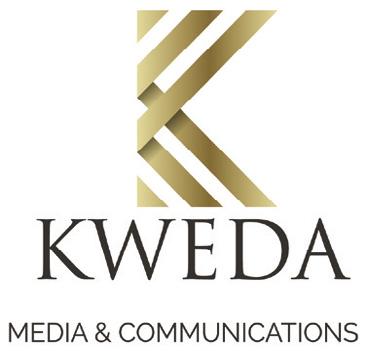
All editorial, business and production correspondence should be addressed to Municipal Focus, PO Box 12454 Plumstead 7800. Manuscripts, illustrations and other material must be accompanied by a stamped, self-addressed envelope. No responsibility can be accepted for unsolicited material. The editor reserves the right to amend and to alter copy and visual material as deemed necessary. Copyright by Kweda Media & Communications. All rights reserved. No part of this publication may be reproduced, stored in a retrieval system or transmitted by any form or any means without prior permission of the publisher. The opinions expressed in Municipal Focus are not necessarily those of the publishers.
editorial, and production correspondence should be addressed to Municipal Focus, PO Box 12454 Plumstead 7800. Manuscripts, illustrations and other material must be accompanied by a stamped, self-addressed envelope. No responsibility can be accepted for unsolicited material. The editor reserves the right to amend and to alter copy and visual material as deemed necessary. Copyright by Kweda Media & Communications. All rights reserved. No part of this publication may be reproduced, stored in a retrieval system or transmitted by any form or any means without prior permission of the publisher. The opinions expressed in Municipal Focus are not necessarily those of the publishers.
All editorial, business and production correspondence should be addressed to Municipal Focus, PO Box 12454 Plumstead 7800. Manuscripts, illustrations and other material must be accompanied by a stamped, self-addressed envelope. No responsibility can be accepted for unsolicited material. The editor reserves the right to amend and to alter copy and visual material as deemed necessary. Copyright by Kweda Media & Communications. All rights reserved. No part of this publication may be reproduced, stored in a retrieval system or transmitted by any form or any means without prior permission of the publisher. The opinions expressed in Municipal Focus are not necessarily those of the publishers.
business and production correspondence should be addressed to Municipal Focus, PO Box 12454 Plumstead 7800. Manuscripts, illustrations and other material must be accompanied by a stamped, self-addressed envelope. No responsibility can be accepted for unsolicited material. The editor reserves the right to amend and to alter copy and visual material as deemed necessary. Copyright by Kweda Media & Communications. All rights reserved. No part of this publication may be reproduced, stored in a retrieval system or transmitted by any form or any means without prior permission of the publisher. The opinions expressed in Municipal Focus are not necessarily those of the publishers.
All editorial, business and production correspondence should be addressed to Municipal Focus, PO Box 12454 Plumstead 7800. Manuscripts, illustrations and other material must be accompanied by a stamped, self-addressed envelope. No responsibility can be accepted for unsolicited material. The editor reserves the right to amend and to alter copy and visual material as deemed necessary. Copyright by Kweda Media & Communications. All rights reserved. No part of this publication may be reproduced, stored in a retrieval system or transmitted by any form or any means without prior permission of the publisher. The opinions expressed in Municipal Focus are not necessarily those of the publishers.


Nedbank is committed to being the business banking partner for the public sector. Our bigger-picture approach to banking is designed to provide groundbreaking solutions for your municipality. With the expertise and knowledge of our community specialists, we can ensure continuity, accessibility and quick decision-making that guides your business growth.


Think bigger. Think Nedbank Commercial Banking. For more information email us at publicsector@nedbank.co.za.













The Department of Cooperative Governance and Traditional Affairs (CoGTA) supports municipalities to create an enabling environment for economic growth. The main task of CoGTA is to provide the necessary support and strengthen municipalities.
“
Municipal Focus talked to MEC for CoGTA in Gauteng, Mr Mzikayifane Elias Khumalo about what this means and entails when facing a national Energy Emergency Crisis in a province with 15 million people, a quarter of South Africa’s population of 62 million.
“The core of the work of the municipality is service delivery, and service delivery means the basic needs of citizens; electricity, water, clean environment and roads,” said MEC Khumalo.
The MEC explained that the challenges that faced our national electricity supplier, Eskom, affected the ordinary citizen, thus the responsibility trickled down from national to the competency of local government.
“It may sound like rhetoric to others, but the reality is that the infrastructure in the Gauteng municipalities is old,” expounded Khumalo. “Consequently, the planned and unplanned outages due to Eskom loadshedding accelerated the decline of electrical infrastructure, such as switchgears and transformers –a number of them are failing or burning out.”
Recognising this challenge around electricity, and keeping in mind that the next physical infrastructure that will be affected in this way is water infrastructure, the Office of the Premier facilitated the formation of the Energy Emergency Council to develop a response to the crises.
A Technical Team was also established under the leadership of the Acting Director General and Heads of Departments to develop an integrated response plan based on Gauteng's Energy Strategy that was developed in 2016.
“The formulation of the Energy Emergency Crisis Response and its implementation was hampered by the political instability that mired the Metros of the Gauteng and thus affected the local municipalities,” MEC Khumalo lamented. “This was caused
by the failure of any political party to obtain an outright majority at the last local government elections – thus necessitating coalitions, which kept on changing because of differences in political views and priorities.”
“The effect of coalition governments cannot be ignored in the Gauteng province because the 2016 and 2021 local government elections resulted in 10 out of 11 municipalities in the province being hung. This necessitated coalition governments.”
He explained that this challenge and trial could not be avoided as it was one of those painful processes that the political leaders had to go through in order to align and learn political expediency. The Metros ground to a halt as political bickering continued – the focus being on power struggles.
MEC Khumalo continued: “Unfortunately the ordinary citizens suffered the brunt of this paralysis. The political leadership in the Metros served political theatre and drama to the country whilst service delivery in some communities in the metros took a knock, with provision of housing, water and refuse removal being among the problems.”
“When Tshwane Metro was paralysed, citizens and commentators clamoured for the our office to intervene,” the MEC lamented. “But the legislative framework limits what can be done.
Some people even thought coalitions were undemocratic or unconstitutional, but in fact they are.”
“We conducted a formal study to understand what can be done and what were the main causes that paralysed the Metros. Among the myriad of factors, two stand out; the perceived outright power of the Executive Mayor and the need to form council within 14 days. >
Both are linked,” MEC Khumalo explained.
“The perception that if you control the Executive Mayor you have absolute power over the Metro’s resources is the reason for the incessant Motions of No Confidence. The need for council to be formed in such a short period does not allow sufficient time for meaningful engagements and agreements between the coalition partners.”
“An easier and quicker solution for the provincial government would have been to place the Metros under administration, something National Treasury considered a number of times, but it would not have been a lasting solution,” the MEC said.
He continued: “As CoGTA we therefore decided to intervene on the ground, working directly with local municipalities and the provincial government at the level of the Office of the Premier as the Energy Emergency Crises was a national and provincial
issue, without leaving out the Metros.”
The Premier’s Energy Emergency Council developed a strategy to respond to the energy crisis in the province.
The province's five-point energy crisis response strategy includes eliminating all illegal power connections, installing smart meters in every home and business, improving revenue collection, cleaning the indigent register and replacing all damaged transformers.
MEC Khumalo expounded: “As stated earlier, the provision of electricity neither a provincial nor a municipal competency, however the municipality bears the brunt of loadshedding because citizens experience the lack of electricity on the ground – at municipal level.”
“We were forewarned and noted that the continuous outages that were breaking and straining transformers

were also straining water pumps, thus breeding a new crisis – a water crisis!” he exclaimed. “And this is another basic service the citizens expect and demand of the municipalities.”
“Remember that most of Gauteng’s water supply comes from outside the province so it has to be pumped in –besides just the purification. Electricity therefore plays a big role in making this basic commodity available to the citizens of the province.”
“In our response to the crisis we therefore had to keep water supply in mind. Water loadshedding therefore forms part of our response to the energy crisis,” he explained.
The Gauteng Crisis Response presented to the Council focused on three areas of intervention;
a. Eskom Transformers Replacement Programme
b. Municipal Programme
i. Transformer Replacement, Smart Meters and Solar High Mast Lighting
ii. Open Cycle Gas Turbines, Micro Grid and Rand Water Loadshedding Exemption
c. GPG Solar Photovoltaic (PV) & Battery Energy Storage System (BESS)
“Poor service delivery breeds protest actions from the citizens, as this is their main tool for voicing out concerns, and this fuels political instability at local level which translates to leadership level,” MEC Khumalo explained. “The bickering in the Metros put more fuel into the fire.”
“Stakeholder engagement at various levels, particularly at local municipalities level became one of the key factors that would influence the success of this strategy. It thus forms part of all our interventions.”

Eskom transformers replacement programme
The province engaged with Eskom and City Power who have the competencies for electricity supply.
“The engagement of these stakeholders resulted in a memorandum of understanding in a few key areas, primary of which is the replacement of transformers that have reached end-of-cycle or have been damaged by loadshedding or have been vandalised, starting in strategic areas or areas that have been without power for a long time,” MEC Khumalo expounded.
The Eskom transformer replacement programme entails replacement of 522 transformers across the Gauteng Province. It also involves the installation
of mini-substations which enhance efficient energy distribution and mitigate the effects of loadshedding.
The program includes two types of transformers: pole-mounted and ground-mounted. Pole-mounted transformers are installed on "H frame" structures, while groundmounted transformers are placed on raised plinths. Both are crucial in electrification projects, converting distribution voltages to 400V/220V for household use.
MEC Khumalo added: “Alongside the new transformers, we are installing new Smart Meters that have better vandal-proof protection. This will assist local municipalities with better revenue collection whilst ensuring that the infrastructure is protected.”
Transformer replacement is prioritised as follows;
Priority 1 (P1)
that have been out of service for an extended period Priority 2 (P2)
which are overloaded/due to illegal connections or load growth Priority 3 (P3)
Transformers at end-of-life cycle and were deprioritised to meet the budget requirements.
“By harnessing solar energy, the Solar High Mast Programme aims to provide reliable, cost-effective, and environmentally friendly lighting solutions that enhance nighttime visibility and security.”
- MEC Mzikayifane Khumalo
“It should also not be forgotten that the burgeoning population of Gauteng puts pressure on this infrastructure and long-term solutions are required and take time,” he expounded. “The situation in Snake Park, Soweto sadly demonstrated this. The influx of jobseekers in the township led to mushrooming of informal houses and a number of transformers got burnt or damaged resulting in the area having no power for over a year. We had to work with our partners to install a number of new transformers to ensure they can handle the current and future loads.”
“Loadshedding occurs when the national demand for electricity is high and Eskom has to ration it out region by region. Our partnership with Eskom and City Power involves the development of own generating capacity for the province, thus minimizing and optimally eradicating the effects of loadshedding on the citizens of the province,” MEC Khumalo continued. “In this regard our response to the energy crisis incorporates the development of Open Cycle Gas Turbines (OCGTs) and Microgrids.” >
“The OCGTs will initially add 100MW of electricity to the Gauteng grid which will later be increased to an installed capacity of 300MW.”
The Energy Emergency Crisis response also includes the installation of Photovoltaic (PV) solar panels on rooftops of GPG Health Facilities and Schools to provide continuous and additional electricity – minimizing the use of diesel generators. Diesel generators come with a myriad of challenges from the price of diesel to the storage and thus demand management of the diesel. The PVs are installed in tandem with Battery Energy Storage Systems (BESS) which enable the solar energy generated in daytime to be stored and accessible after hours or as and when needed.
The installation of these systems will alleviate the impact of load shedding and ensure business continuity at GPG facilities (Hospitals, clinics, municipal service centres and Schools).
MEC Khumalo explains: “The Thelle Mogoerane Regional Hospital has three 12-meter containers housing the inverters and batteries. The hospital has 6 x 250 kW inverters and 3.2 MWh of battery storage. The installed equipment can take the hospital off-grid during a sunny day! This means that during a sunny month the hospital puts no pressure on Eskom and functions normally 24/7!”
Microgrids – service delivery going green
“In line with our partnership with Eskom and City Power we have launched a Solar Micro-grid in Alexandra Township,” MEC Khumalo continued. “The micro-grid uses solar panels have dual technology — getting energy from the sun on top, as well as radiation from the heat from the ground underneath. It comprises 1 megawatt of solar PV panels and 2

megawatt hours of battery storage and supplies electricity to 200 households that have never had formal electricity connections before.”
MEC Khumalo explained: “The grid also includes security features, the boundary walls, paving the dirt road to prevent dust from affecting the efficiency of the system and the electrification of the households (lights, poles, streetlights, cables), and smart meters. It is an integrated system.”
“Collection of revenue is not ignored,” he continued. “The National Treasury provides a free basic electricity grant of 50 kilowatt hours to households. So at least there’s revenue that
is coming to City Power. Then they’re also able to take care of the infrastructure.”
“City Power will also benefit from having less pressure on the transformers due to illegal connections which increases in winter. Illegal connections cost City Power millions every winter. In just one year, City Power had to replace mini-substations seven times, which cost them hundreds of thousands every single time.”
The Gauteng Province has committed through the Energy Emergency Crisis Council to replicate these grids in other informal settlements in the province to alleviate pressure on
the national grid and the effect of loadshedding on Gauteng citizens. “The microgrids offer a quick electrification solution to address the backlog of our citizen’s access to power, whilst using green energy which is friendly to the environment,” said MEC Khumalo.
Fighting crime in the community the green way
During loadshedding when streetlights go out incidents of crime increase in the communities. These include among others the vandalising of power infrastructure through cable and copper theft. The Energy Emergency Crisis Council identified the installation of Solar High Mast Lights (SHM) as a viable solution.
The SHM will not go off during loadshedding, thus ensuring that the streets in communities remain lit and criminals are deterred.
MEC Khumalo adds: “The Solar High Mast Programme is an innovative and transformative initiative designed to improve public safety and promote sustainable energy use in the municipalities. This project entails the strategic installation of solarpowered high mast lighting systems across various key locations, focusing primarily on underserved and crimeprone areas.”
“By harnessing solar energy, the programme aims to provide reliable, cost-effective, and environmentally friendly lighting solutions that enhance night-time visibility and security. It is a communitycentric approach, involving local stakeholders in the planning and implementation process to ensure the project addresses the specific needs and concerns of the residents.
The ultimate goal of the programme is to reduce crime rates, support after
hours local economic and social activities, and contribute to the overall development and wellbeing of the community while also aligning with broader environmental sustainability goals.”
“The SHMs will also be aligned to strategic infrastructure locations to ensure that CCTV cameras can be used to constantly monitor and discourage crime,” said MEC Khumalo. “Ultimately these lights should be rolled out throughout the province to reduce electricity demand.”
“The use of SHMs also removes the scourge of illegal connections that are made on standard high mast lights, thus saving the local municipality from loss of revenue,” the MEC added.
Alleviating and preventing the next crisis – water supply
MEC Khumalo explained: "The energy crisis has also had a negative impact on water reticulation and water treatment. Part of the province's energy response includes prioritising the provision of uninterrupted quality water supply and treatment."
"We have started a programme to mitigate the water supply interruptions brought about by power outages and loadshedding through the creation of an additional point from a separate substation to ensure uninterrupted electricity supply to the Rand Water booster stations at the Eikenhof Pumpstation and Robertsville Booster Stations,” he added.
"This intervention is designed to exclude these stations from the loadshedding schedule and enhance the reliability of water supply not only to our province, but to the Free State and parts of the North West Provinces as well,” he continued.
of increased available capacity for Gauteng
City Power has refurbished and recommissioned the Open-Cycle Gas Turbines (OCGTs) at the John Ware and Karzene substations to provide at least 50MW of electricity each to the grid in Gauteng.
MEC Khumalo explained: “Through the energy crisis response council, City Power and the Gauteng provincial government signed a memorandum of understanding to help eradicate loadshedding in the province even when Eskom ramped up load-shedding to higher stages. The province, through City Power, plans to build power generating capacity to deal with loadshedding and decrease over-reliance on Eskom.”
“The province will support City Power to use its interventions of decreasing load-shedding, such as load limiting and recommissioning open-cycle gas turbines,” he added. “Not only will this be limited to the City of Johannesburg, but the plan is to roll out its interventions in other municipalities in Gauteng.”
“The importance of stakeholder engagement and relations cannot be overstated,” MEC Khumalo said. “We had been made to understand that the Low Voltage network around Evaton Central & Small Farms had collapsed, thus Eskom was unable to install the 106 failed Transformers, even though they were available.”
“By engaging Eskom, the local municipality and community, we managed to find a solution. At the end more contractors were engaged and the turn around time to install transformers in the townships of Sebokeng, Orange Farm, Palm Springs and Evaton West was shortened,” he added. >
MEC Khumalo said, “When we engaged with City Power we learned that there are a number of OCGTs that can be brought on line to supply the province with power. This infrastructure has been standing idle for years and only needs refurbishment.”
"We set an objective for ourselves that we cannot sit aside as the provincial government while the situation [loadshedding] is getting out of control as it is. Load-shedding has huge economic implications for the province and the investments that we want for the province."
“The protracted national electricity crisis had caused significant hardship for people in the province and had had a detrimental effect on the growth of Gauteng’s economy. Power shortages have a negative impact on the availability of healthcare services, food and water, the level of crime, and unemployment rates, among others,” the MEC said.
“The province requires at least 3 000MW of electricity to escape from the grips of load-shedding,” he added. “Gauteng consumes about 24% of the 41,5 GW of electricity produced by Eskom for the country. Since we plan to grow economically, we shall need more.”
“For efficient delivery of services at local municipality level, the importance of stable political leadership at the level of the Metro is of outright importance,” MEC Khumalo said. “The infighting at the Metros has shown that South Africa is not ready for coalition governments. It takes a certain level of maturity to run a coalition. Seeing it work in developed countries makes people think it is doable here, but we are a country still developing.”
MEC Khumalo expounds: “Based on what we learned from our study and
are experiencing on the ground, going to 2026 elections, our office shall engage on the following;
• Consult extensively with municipalities, political parties and SALGA with a view to introduce Collective Executive Type for the whole province after the local government elections – this will reduce Motions of No Confidence on Executive Mayors;
• Engage COGTA National to determine the best ways to introduce legislative and regulatory frameworks to regulate various aspects of local government impacted by coalitions including the period allowed to constitute Council after elections, drafting of coalition
agreements, motions of no confidence going forward etc; and
• Engage the IEC to run a modelling exercise to test the viability and appropriate levels to set electoral thresholds for municipalities as well as legislative implications.”
He continued: “There are still many issues to process to get coalitions right. Our reality though is the messy coalition governments we are witnessing in Gauteng metros. We need to stabilise those so that we can serve our people correctly.”
“We therefore have to make choices as political leaders whether we want to play politics or serve our communities,” MEC Mzikayifane Khumalo concludes.



Set for 29 May, the 2024 National and Provincial Elections mark South Africa’s seventh democratic election since the end of apartheid in 1994. Chief Electoral Officer Sy Mamabolo emphasises the Electoral Commission’s readiness amidst commemorations of 30 years of democracy.


As the calendar inches closer to the pivotal election dates, the buzz surrounding democratic processes grows louder. Elections serve as the cornerstone of democracy, where the collective voices of citizens resonate in the ballot boxes, shaping the trajectory of nations and communities.
However, behind the scenes, meticulous preparation is under way to ensure that the democratic machinery operates seamlessly on the designated day.
The 2024 General Elections will be held on 29 May to elect a new National Assembly as well as the provincial legislature in each province.
In his address at the National Pledge Signing Ceremony for the Electoral Code of Conduct, held in Midrand on 4 April 2024, the Electoral Commission’s Chief Electoral Officer (CEO), Mr Sy Mamabolo, said it is vital to reflect on one of its abiding successes as the country commemorates the 30th anniversary of its democracy.
“Today, we stand before South Africa and her people to affirm our readiness to conduct an election which accords with the constitutional yardsticks and international norms. We give this affirmation of readiness, alive to the enormity of the challenge that rests on our hands. We stand ready to assiduously ensure that we do not let the motherland down for otherwise history will have a deleterious account of our charge of this task,” he said.
Following the proclamation of the election date by the President and the provincial premiers, the Electoral Commission published an Election Timetable on 24 February.
The timetable is an important statutory instrument that guides the performance of various >
election activities. It provides cut-off times for the performance of these important electoral activities. The timetable is a statutory guardrail for the preparations of the elections. It is a guiding light for electoral preparations. Compliance to the provisions and terms of the timetable is not an option but such compliance is peremptory for contestants, voters and the electoral administration itself.
“While challenges abound and uncertainties loom, the resilience and determination of our electoral body, policymakers, and citizens alike serve as beacons of hope for the future of democracy.”
– Sy Mamabolo
The voters' roll was certified on March 12, 2024, following two rounds of registration weekends and a persistent effort to promote the online registration method. The foundation of a legitimate election is the validation of the voters' roll. Currently, the certified voters’ roll stands at 27.7 million voters. South Africa has not seen this level of
registration since the voters’ roll was first established in 1999. Remarkably, 2.4 million voters have utilised the online registration portal since its inception in July 2021, either to update their registration information or register for the first time. Youth registration is starting to show some early indications of improvement because of this portal's effectiveness.
Measured against the estimated voting age population, the registration coverage in the 18–19 year-olds stands at 27%, while registration coverage stands at 48.6% among 20–29 year-olds. Coming off a low registration base, the historical under-representation of young persons on the voters’ roll is showing welcome signs of amelioration. There are more female registered voters than there are men: 15.3 million voters are female and 12.4 million male voters. The provinces of Gauteng and KwaZuluNatal jointly account for 44% of voters in the country. Gauteng has 6.5 million voters, while KwaZuluNatal has 5.7 million voters. The province of the Eastern Cape comes in third position with 3.4 million registered voters.
In line with established electoral practice, electronic copies of the
voters’ roll with redacted identity document numbers to align with national frameworks for protection of personal information have been advanced to participating contestants. This will enable contestants to canvass votes, and also enable them to verify the accuracy of the roll.
On April 12, the Commission issued certificates to 14 889 candidates who will contest 887 seats in the forthcoming elections. Nomination of candidates closed on 8 March 2024 and following processes of verifications and objections 70 political parties, and 11 independent candidates were published as final contestants in these elections.
Fifteen political parties are contesting all tiers of the elections which means the compensatory seats in the National Assembly, the nine province-to-national elections as well as the nine provincial legislatures. A total of 31 political parties will contest the national elections for the first time.
An analysis of the list of candidates reflects that at 58.14% or 8 658, are male, with female candidates at


41,86% or 6 234. Candidates in the age category 40-49 are the majority at 4 361, followed by the 3 708 in the 50-59 age category and the 3 406 in the 30-39 age group. Voters who are over 60 stands at 1 924 and those between the ages of 18-29 are 1 493.
Notably, there are 15 candidates who at 18 years are also first-time voters. Of the 15, nine are female and six are male. These candidates are spread across eight political parties. There are 17 candidates who are aged 80 years and more. The majority 16 are male candid ates standing for four political parties leaving only one female candidate in the age category. On gender representation, 15 political parties have a female representation of 50% and above. Seven parties achieved a 40% and a further 14 parties have a 30% female representation on their lists.
Turning to voting stations, in line with the provisions of the Election Timetable, the Commission published the list of all voting stations and their locations on 12 May 2024. The Commission has grown the network of voting stations to 23 292, and is committed to providing a consistent service to voters at all these voting stations. This includes 954 temporary voting facilities where physical infrastructure is not available.
An election is obviously a logistical undertaking of serious proportions. Over 95% of logistical supplies for election day are already at hand, and the Commission in the process of distributing 1 873 tonnes of material between its different warehouse and storage facilities across the country.
With the voters’ roll certified, the Electoral Commission’s education
efforts now turn to balloting education, both on traditional and digital channels, and through face-toface interactions in communities at a ward level. That is, presenting the three ballots to be used in the election and what each of these represents and the eventual translation of valid votes to seats in the ten legislative assemblies.
It would be remiss not to mention social media because a significant proportion of the electorate receive news and engages politically and socially on social media platforms. These therefore form part of the mix of platforms to provide voter education and importantly to animate registered voters to vote on 29 May.
“A credible electoral framework must make provision for those who are in special circumstances. >
The Commission reminds South Africans that there are two categories of special votes affected by this deadline” Mr Mamabolo said. The first category relates to home visits for those registered voters who are infirm or have impaired mobility.
Such voters may apply to be visited at home or a place of confinement. The second category of special votes is available to any registered voter who wishes to vote early at their voting station. There is no automatic agebased qualification for a special vote. Special votes are available to all voters, but only upon application by the deadline date of 3 May 2024.
“As we stand on the precipice of yet another electoral cycle, let us reaffirm our dedication to upholding the sanctity of the ballot box and ensuring that every voice is heard and every vote counts. It’s your democracy, own it.”
– Sy Mamabolo
As matters stand, over 78 000 voters have registered on the international segment of the voters’ roll or indicated that they will be voting out-of-country. These voters will be provided for at the diplomatic missions of registration.
Citizens voting out-of-country will be able to vote in the national election at their mission as follows:
• Algiers, Amman, Cairo, Damascus, Jeddah, Kuwait City, Ramallah, Riyadh, and Tehran will vote on Friday, 17 May 2024 between 07h00-19h00.
• The rest of the 102 missions listed in the schedule attached and on the website will be open for special votes on Saturday, 18 May 2024, between 07h00 and 19h00.
• In respect of the mission in the United Kingdom, the Commission has determined two days of special voting. These are Saturday 18 and Sunday 19 May 2024 from 07h00-21h00. The additional special voting day and extended voting hours are intended to enable proper arrangements for
the 24 535 voters entitled to vote at the mission. Similarly, extended voting hours have been prescribed for the missions in Washington DC and New York. The voting hours are 07h00-21h00.
The 10 largest international voting stations by voting population are London (24 535 eligible voters), The Hague (6 659), Canberra (3 674), Dubai (3 266), Dublin (3 040) Wellington (2 292), Abu Dhabi (1 825), New York (1 799), Washington DC (1 799) and Berlin (1 478).
In collaboration with the Department of International Relations and Cooperation (DIRCO) the Electoral Commission has begun the process of shipping voting materials including, voting booths, ballot boxes, ballot papers, stationery packs, and the relevant lists of approved voters, to the 111 South African missions across the world.
Furthermore, voters who will be outside of the voting station of registration do not lose their right to vote. Such voters may still access the voting process by notifying the CEO,
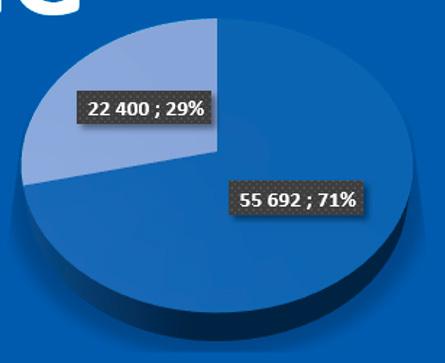

in terms of Section 24A of the Electoral Amendment Act, that they will not be at their voting station on election day and where they will be casting their ballots by no later than 17 May 2024.
Visit www.elections.org.za to give a Section 24A notice.
The Commission is in the final stages of training 202 500 voting officials who will administer the electoral process in the voting stations. These staff are being subjected to a hybrid training involving online modules as well as practical modules.
To improve the quality of the counting and the completion of result slips, the Commission is instituting a new category of staff who will support the presiding officer with the counting effort, known as counting officials.
The CEO called on citizens, members of the media and the leaders of political
parties to lead by example, fostering an electoral environment characterised by trust, integrity, and respect for all.
For its part, the Electoral Commission commits itself to pronounce an election outcome rooted in the choices of the South African voters.
“While challenges abound and uncertainties loom, the resilience and determination of our electoral body, policymakers, and citizens alike serve as beacons of hope for the future of democracy. As we stand on the precipice of yet another electoral cycle, let us reaffirm our dedication to upholding the sanctity of the ballot box and ensuring that
every voice is heard and every vote counts. It’s your democracy, own it.”
Key election dates: 17-19 May, 7am-7pm Voting out-of-country
27 & 28 May, 9pm-5pm : Special voting in-country
29 May, 7am-9pm: Election day in South Africa
31 May, 5pm: Close of objections
Within 7 days: Announcement of election results

Municipal Focus talked to CEO, Ms. Obakeng Nyundu about the road she and the HCT have travelled.
Like all other major cities in South Africa, the City of Tshwane suffered the challenge of limited available land for further development as a legacy of segregated planning under apartheid. This meant that in the new dispensation there was no land available to address immediate challenges of housing for low-income citizens and economic migrants.
The Housing Company of Tshwane (HCT) began a process of addressing this challenge, and in this regard the Townlands Social Housing Project in Marabastad was built, providing better and affordable housing in the area that would enable low-income earners to access places of work, economically and with ease.
The City of Tshwane, as the former seat of the apartheid government, practiced the worst form of land segregation and relegated the majority of its former citizens to living in squalor or out in the hinterlands. The advent of democracy promised better life and economic opportunities, so an influx of economic migrants flooded the city, resulting in urgent demand for accommodation.
The Housing Company Tshwane (HCT) was formed to address this unjust legacy of apartheid spatial planning, and under the stewardship of Ms.
Obakeng Nyundu, the HCT recently launched what has been hailed as “the biggest social housing project in South Africa”.
MF: The mandate of HCT is to deliver social/affordable housing to Tshwane citizens, what is your vision alongside this mandate?
When I first joined the entity, the mandate only focused on the development of Social Housing. Through experience, one realised that there are different needs for different people in the rental


housing market. In 2023 the mandate was expanded to accommodate other rental tenure options.
The vision is to create an entity that has a trajectory where one enters as a student in the student accommodation portfolio, once qualified and has entered the young profes-sional space would move into the social housing market and as they grow in their career become homeowners through the First home finance programme. Now that the mandate has been approved to accommodate different types of affordable rental tenure options, the strategy is to ensure that it comes alive by developing mixed use developments and making sure that there is opportunity for all the rental tenure options available.
Furthermore, the entity should contribute to addressing urbanisation, the historical inequalities by bringing back the previously disadvantaged to the inner city and urban areas, providing affordable, decent housing and services that promote social equity, and ensuring sustainable and resilient communities where people can live, work and pray. >



MF: When the Townlands Housing Project was launched, it was lauded as the 'largest social housing project in the country', what was the thinking behind its placement in Marabastad?
The Social Housing Models has been a pivotal tool in contributing towards the urban restructuring and urban renewal programme through urban integration and impacting positively on the urban economy. The project is located in the western part of Pretoria’s Inner City and part of the West Capital Precinct Development Programme. It is located close to government departments, other places of work, shops, social amenities and public transport.
Marabastad has always been perceived as a place where sub-standard counterfeit products are traded, this perception did little justice to this valuable piece of real estate with rich history of forced removals. The Group Areas Act of 1950 was a cornerstone of apartheid policy, mandating the segregation of different racial groups into designated areas. This act led to the forced removal of many non-white communities from areas designated as “white-only”. Before the forced removals, Marabastad was a vibrant, multi-racial community with a diverse population of black Africans, Indians, coloureds, and a smaller number of whites, it was known for its cultural diversity and economic activity.
It is against this backdrop, that the location was strategic for developing a social housing project that will upon completion, address such brutal injustices of the past and return people to the place they once called home. The project is highly accessible due to its location along two mobility spines viz. Es’kia Mphahlele/Cowie Street (north‐south linkage) and Struben Street/Johannes Ramokhoase (east‐west linkage).
The Belle Ombre Plaza and transport hub is located approximately 500 meters north of the development. Belle Ombre transport hub (Railway station, bus depot and taxi rank) serves as the northern gateway into the City and provide linkages to areas such as Mabopane, Soshanguve and Garankuwa. The hub caters for long distance bus and taxi commuters and the Metrorail connects with the Tshwane Ring Rail network which links with the eastern areas.
MF: This project was done during a tumultuous coalition government period in the Tshwane Metro, did that affect the project?
Yes, the tumultuous coalition government period in the Tshwane Metro did affect the project. Political instability often brings challenges such as shifts in policy priorities, changes in leadership, delays in decision-making processes, and disruptions in funding allocations and competing priorities. For HCT, these political dynamics likely created an uncertain environment, complicating the execution of the social housing development project hence the delay in the development.
MF: How did you navigate your way around this?
Navigating through the challenges posed by the coalition government required strategic planning and adaptive management. HCT was able to effectively manage the complexities of operating in a politically unstable environment, by demonstrating competence in the sector, ensuring the successful development of affordable rental in the City of Tshwane. The focus remained on the long-term vision of demonstrating that affordable rental is the new solution to addressing the housing backlog, addressing
historical inequalities, accommodating urbanization, promoting social equity, and ensuring sustainable and resilient communities.
MF: The construction of this huge project obviously created many job opportunities, did women play a part of this process, and if so, what?
The project is inclusive in its nature, from the head of department in the City of Tshwane to which the entity reports to is a woman, From 2016 to date the entity has been spearheaded by a woman CEO’s, the development manager for the entity is a woman, responsible for the managing the development programme of entity, the lead company for the Townlands project is owned by a woman, architects all the way to the construction team were dominated by women. The project has created sustainable job opportunities for over 400 people over a period of four years. There were 45 women sub-contractors with the following trades: glazing, electrical, plumbing, tiling, painting, and plastering.
MF: Who are the beneficiaries of the Townlands Housing Project, and what are the requirements to qualify for the housing?
The Townlands Social Housing project targets individuals whose household gross income is between R1850 to R22000, they can be employed or selfemployed. The applicants have to be South African Citizen over the age of 18 and should have a good credit record.
MF: Can you talk about the problems the Townlands Social Housing Project is trying to address?
Firstly, the project was to address
Urbanisation. Marabastad has a history of forced removals, the project is relocating or rather creating homes for individuals of all genders and races back to the inner city, closer to the economic hub.
Secondly, by creating homes closer to economic opportunities and working environment which contributes to a healthy family life as people get opportunity to spend more time with their family than traveling to-from work. For example, Sophia is selling food in the inner-city and would need to leave Hammanskraal at 4am to catch a train to town to arrive at 6am and start preparing for breakfast and lunch. Departs the inner-city after work between 6-6:30 pm only to arrive at 8-9pm. Sophia leaves home the kids are sleeping and comes back the kids are sleeping. She does not get the opportunity to prepare them for school, assist them with homework nor prepare supper for her family as she has to work to provide for them. Living closer to work enables her to get to work at a reasonable time and return well in time to spend time with her loved ones.
The project is trying to address the scarcity of decent housing in the city for people in the low-middle income bracket. A person who earns R1850 could not afford to stay in a decent housing in the city and afford the other basic necessities as rental was expensive. Now a single mother, for example, earning a minimum income of R2000 can only pay R625 towards housing and will be able to spend most of her income on other necessities.
Last but not least, the project is contributing to urban renewal/ rejuvenation. Marabastad is known for its sub-standard counterfeits and that deemed the area to be sub-standard. Building a multi-million, high quality, high density gave new energy >



and revitalized the area, giving it a modern look and putting some spark into the area.
MF: Are there any specific steps taken by HCT to ensure the correct beneficiaries are assisted, considering the huge demand for housing?
The entity developed a vigorous but yet transparent application and vetting process that ensures that we approve only eligible beneficiaries. HCT has also invested in systems that assist in the verting process that can verify a person’s true identity and credit profile. Once an applicant is successful training and support is offered and allocation is made on a first come serve basis.
MF: What features does the Townlands Social Housing Project have that makes it a conducive space to stay in? How many people can Townlands house? Can you also describe the features of the housing units? i.e. size, number of bedrooms, etc.
Townlands Social Housing boasts of the following which includes mixeduses such as retail, social amenities and housing that can serve as an example for urban innovation. In terms of community-use space/ facilities the project has the following:
• Administration offices
• Children’s play area
• Outdoor gym
• Sport fields
• Hot water central heating system
• Beautiful landscaping with braai areas
• Bicycle track
• Tuck shops
• A biometric access control system
• CCTV cameras
• Central DSTV
There are 1,2 & 3-bedroom units ranging from 38m2 to 52m2, with built-in kitchenet, lounge area and a bathroom. The project can accommodate 1200 families with a minimum of 3600 occupants.
MF: Besides the expected limited resources versus huge needs conundrum, what challenges does HCT face?
Our people are financially indebted, which has created an unhealthy credit profile. The demand for accommodation in Townlands was enormous while the uptake/allocation is very slow due to unaffordability and bad credit record.
This raises a concern on the future pipeline as well as the indication is that as much as there is a high demand on taking up affordable rental, the prospects of success to meet that demand is also very low because of the bad credit record and affordability.
As part of the drive to educate people about social housing, it’s important to also educate them about keeping a healthy credit record and reducing unnecessary accounts. This is a very big risk to the programme.
MF: What has been the biggest lesson you have learned in the development of Townlands?
The biggest lesson learned in the development of the Townlands Project is the critical importance of comprehensive and proactive planning, particularly in addressing bureaucratic and regulatory challenges, securing stable funding, and ensuring effective stakeholder engagement. Overall, the biggest lesson from the Townlands project underscores the necessity of a holistic and integrated
approach to housing development that prioritises comprehensive planning, financial stability, stakeholder engagement, and adaptive management. By incorporating these elements, future projects can better navigate complexities and achieve their objectives more effectively.
MF: With the huge need for housing for the marginalized and disadvantaged in Gauteng, are there any other social housing projects in the pipeline for the City of Tshwane?
Yes, with the significant need for housing for marginalized and disadvantaged populations in Gauteng, the City of Tshwane has several land parcels earmarked for affordable rental

projects. There are engagements with other spheres of government in forging partnerships to develop more mixeduse developments and other rental tenure options. Amongst others, below are some projects in the short-medium term pipeline for social housing:
• Chantelle Social Housing to yield 1098 units
• Timberlands Social Housing to yield 609 units
• Sunnyside Social Housing to yield approximately 400 units
MF: What is the HCT promise to the citizens of the City of Tshwane going forward, as we celebrate this milestone occasion of 30 Years of Democracy?
As we celebrate 30 years of democracy, Housing Company Tshwane will continue to provide affordable housing solutions to the residents of Tshwane and to those coming from outside the municipal demarcation to find working opportunities in the Capital City, as it’s envisioned in our mission and vision.
Tshwane is the 3rd biggest metropolitan municipality in the world after Tokyo and Japan, and the City is home to majority of embassies and consulates. With these within our shores, the demand for affordable housing will at times, exceed supply.
As the entity is entrusted with the delivery of affordable housing in the City, we need to ensure that we have sufficient resources, manpower, land
and political will to match demand and supply.
As we march to the next 30 years, our objective is to streamline the approval processes and reduce bureaucratic delays to expedite the construction of new housing units, identify well located unused public land for residential development and forge healthy public and private partnership.




The DKMS Group is one of the most significant non-profit organisations in the world dedicated to fighting blood cancer and blood disorders. With twelve entities, a global presence in seven countries on five continents and a strong commitment to saving lives, we work tirelessly to connect patients with matching blood stem cell donors. In South Africa, we have launched a Paediatric State Patient Programme under our Access to Transplant pillar. We are working with public hospitals including Steve Biko Academic Hospital (SBAH) and Inkosi Albert Luthuli Central Hospital (IALCH).
Our mission is to increase the number of potential donors worldwide, enhance the ethnic diversity of our database, provide life-saving transplants to patients in need, and improve patient outcome of South African patients currently living with and getting treatment for haemotology cases.
Every 72 minutes, someone in South Africa is diagnosed with blood cancer or a blood disorder. Stem cell transplants are a potentially lifesaving treatment for more than 70 different diseases like leukaemia, aplastic anaemia, thalassemia and sickle cell disease and for many patients, a blood stem cell transplant is their only hope of a second chance at life. Only 0.04%
of the South African population are registered donors and DKMS Africa recruits diverse stem cell donors to give all patients in South Africa and the world a fighting chance against blood cancer.
To achieve this we need 80% Black, 9% Coloured, 8% White and 3% Indian donors on our donor registry.
The work we do at DKMS Africa extends to creating tactical education and awareness campaigns, going to universities, collaborating with corporate organisations, and organising donor recruitment drives across various communities together with patients and their families. All of this is to help ensure that we are doing the following, which are at the core of our work:
• Raising awareness and educating communities on the effects of blood cancer and blood disorders
• Donor recruitment drives across various communities to help increase the number of diverse donors on the registry
• Assisting with transplantation costs for patients who can’t afford costs associated with transplants
We at DKMS Africa pride ourselves on growing a community of people committed to one cause: fighting blood cancer and blood disorders in South Africa, across the continent and in the world. We are passionate about the patients we serve which is why we believe in telling their stories of hope and survival.

One such patient is Tsakane Mthini , an 11-year-old aspiring netball player, who has been diagnosed with Acute Myeloid Leukaemia. and would love nothing more than to live out her dream and play for South Africa, the country she so loves. Tsakane's symptoms started in early 2021
(April/May). Her parents initially thought that her weight loss was due to her being a growing child (she had lost a significant amount of weight).
When she started losing her appetite and couldn't keep her food down her parents took her to the hospital. >
In January 2022, she was admitted to the hospital and began her treatment once she'd been diagnosed. Her parents were in complete shock when they got the diagnosis. They were initially told that this was a terminal illness so they lived in fear that they would receive tragic news any day that their daughter had passed.
Once they heard that a bone marrow transplant could save their daughter's life they became more hopeful.
Tsakane is struggling to come to terms
with everything and even though she doesn't speak openly about her illness her parents can see that she is struggling. Every time she has a headache or she has flu-like symptoms she's immediately retraumatised and begins to think the worst. Tsakane was not able to attend school in 2022 due to her illness, but was able to return in January 2023. Her school has been understanding and very supportive.
Her father gloats that she is thrilled to be back in school and it shows in her spirit.

We also have 26-year-old Londeka Mdletshe who was diagnosed with Acute Myeloid Leukaemia. Her future hangs in the balance as there is currently no match for her on the global stem cell registry. Londeka's journey began with unexplained stomach aches and ulcers in December 2022. Recurrent headaches and shortness of breath followed. This led to countless doctors’ visits which left her
feeling hopeless until May 2023, when she received her diagnosis.
Since her diagnosis, she has endured a grueling cycle of hospital admissions and discharges, often spending months confined to a hospital bed. With a 5-year-old daughter, Londeka had plans to further her studies and pursue a Bachelor of Arts degree at UNISA, so as to
be able to give her and her daughter a beautiful life. However, due to her declining health, she was unable to actualize her plan.
Working together with different stakeholders, including the South African National Department of Health, we recognise the need to elevate the voices of patients who are living with blood cancers and blood disorders into public discourse.
As DKMS Africa, we aim to assist as many patients as possible and provide them with a second chance at life! Over the past three years, with the help of individuals, the medical fraternity, tertiary institutions, corporates, trusts and foundations, the media and other stakeholders, DKMS Africa has been able to recruit over 80 000 potential life savers and help contribute towards saving the lives of over 1100 000 patients worldwide.
In order to keep making an impact in the lives of blood cancer patients and patients suffering from blood disorders, we need everyone to get involved in many different ways so that we can carry on giving patients a second chance at life!
To find out more about how you can get involved and help us in our fight against blood cancer and blood disorders, visit www.dkms-africa.org
CONTACT DETAILS
Tel: 021 701 0661
Website: www.dkms-africa.org
Email: info@dkms-africa.org
Address: Block C, Grosvenor Square, Century Way, Century City, Cape Town, 7441

At Xylem we are 100% about water, including delivering transformative solutions across the entire water cycle. We are pioneering our approach through 360 Performance solutions, delivering source-to-tap support, products, engineering expertise, and more for real value, efficiency, and lasting performance. Let’s Solve Water is more than a slogan, it is our mission! Discover 360 Performance, the cornerstone for a sustainable water future.
With a powerful edge, the Sensus H2Olmes portal stands as a force to reckon with: a cloud-based water track and management platform that provides real-time data and insights to help you optimise your water network with unparalleled precision and accurate 360 Performance.
THE PLATFORM FOR WATER METER READING COLLECTION, DATA AND ANALYTICS MANAGEMENT
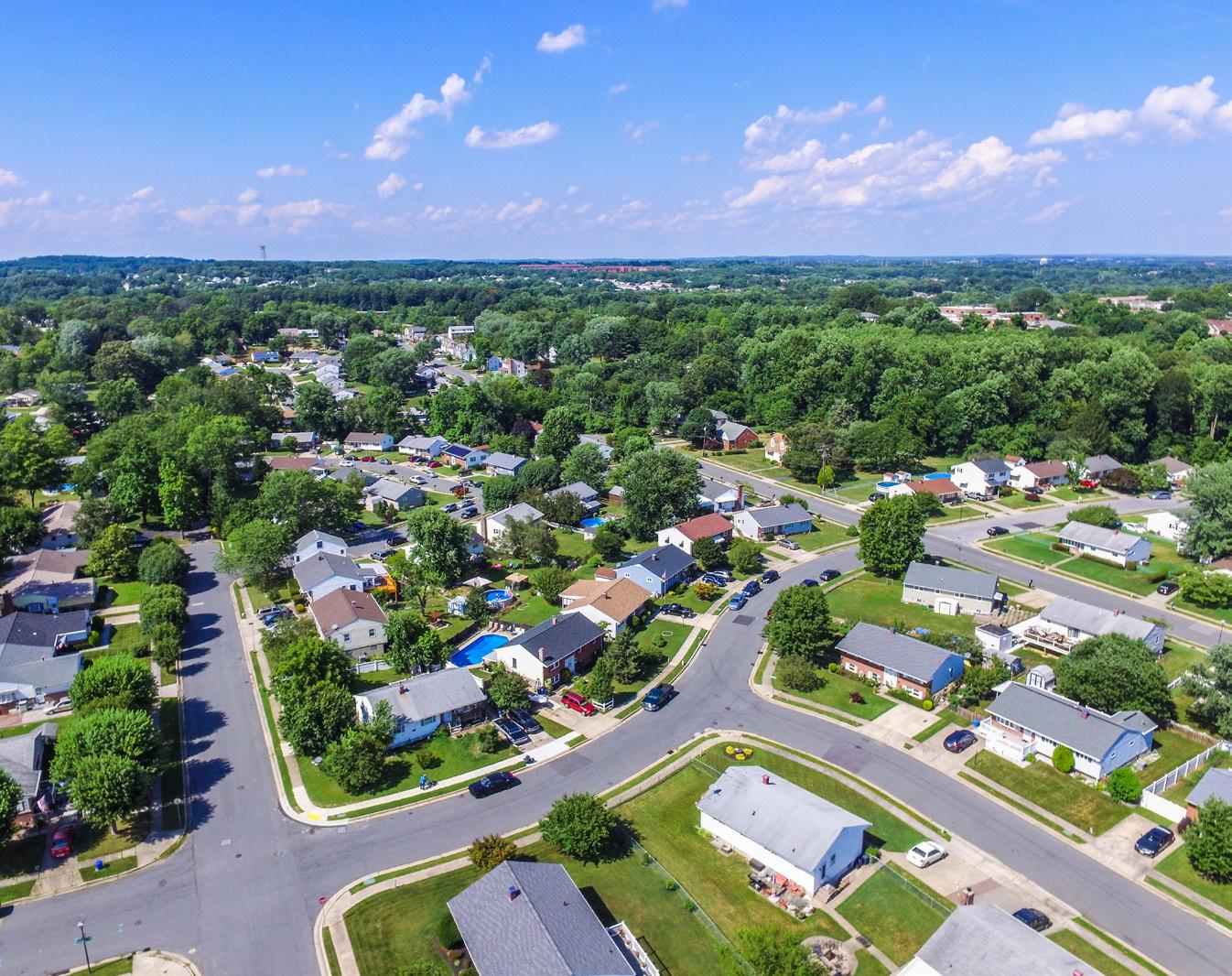






































The built environment touches all aspects of our lives, from our homes and offices to places of instruction and entertainment, shopping centres, and factories. These spaces, alongside supporting infrastructure like water supply and energy networks, set the stage for all human activity.
Historically, the built environment has been mostly about buildings and their physical use, with less attention given to adopting digital tools and utilising data to track and systematically enhance the energy performance of buildings.
Accelerating decarbonisation in the built environment proves crucial for a sustainable future, compelling players in this ecosystem to invest significantly in decarbonisation measures.
As a critical enabler of this transformation, the utility management landscape experiences change at an unprecedented pace. Currently, much emphasis is placed on innovation and aiding property owners in embracing
the transition to clean energy, thereby reducing the “operational” carbon emissions of their buildings – those emissions stemming from heating, cooling, and lighting.
This evolution, driven by technological advancements, reshapes consumer expectations, shifting the utility management industry from its traditional focus on meter readings and straightforward billing towards a more integrated, dynamic, and sustainable model.
The age-old practice of monthly meter readings is drawing to a close in the face of the modern world’s dynamic and fluctuating energy demands.
Traditional methods and legacy systems no longer suffice to capture the complete picture of energy consumption and building operations, necessitating a shift towards realtime load profile consumption data enabled by smart metering.
The transition to smart metering isn’t solely about collecting more data; it’s about ensuring accurate, transparent billing and leveraging actionable intelligence to optimise energy usage, reduce costs and downtime, and improve decision-making. Real-time analytics of energy consumption data facilitate predictive maintenance by identifying concerns before they escalate.
Valuable consumption data delivered by smart metering enables both effective energy management and streamlined maintenance processes. Decision-making is accelerated, and outcomes are of higher quality.
RMS leads this shift by designing and installing smart metering solutions for retail, commercial, industrial and residential properties as a vital aspect of our advanced utility
management solutions. We harness the value of real-time data, offering property owners and managers a detailed view of their energy consumption patterns and enabling proactive and informed decisions.
This represents a fundamental shift in utility management, transitioning from a reactive to a proactive, realtime model, prioritising efficiency and sustainability.
Reliance on a single grid is outdated, and energy diversification, or using different energy sources to meet demand, has become imperative. The challenges of load shedding, the urgency of decarbonisation, and the volatility of energy markets demand a more flexible, resilient approach.
Today, the new normal consists of a blend of generators, embedded solar panels, and energy wheeling and storage solutions. This mix characterises the modern energy landscape, enabling property owners to meet supply needs consistently, smoothing fluctuations, decarbonising their operations and meeting the energy needs of their tenants.
Integrating renewable energy sources with existing systems requires meticulous planning and management and adequate infrastructure and business processes to ensure grid flexibility, demand response, reliability, and efficiency.
RMS designs systems and business processes to seamlessly integrate these diverse energy sources, ensuring property owners have a comprehensive view of their energy infrastructure. This integration accelerates sustainability efforts and reduces greenhouse gas emissions, aligning with global endeavours to combat climate change. >
Investing in the latest technology alone is insufficient when managing energy usage in buildings, and success often relies on behavioural factors. The International Energy Agency (IEA) calculated that changing human behaviour and creating awareness can realise up to 25% of energy efficiency potential, and smart metering is an essential technology to provide the information to motivate people to reassess their habits.
The role of tenants in energy management is crucial and undergoing a significant shift. Most of today’s tenants are informed, environmentally conscious, and financially savvy. They demand a say in their buildings’ energy sources, with a keen interest in the environmental benefits and financial savings of alternative energy sources. Investments in the requisite smart metering technology are required to empower tenants to participate and actively take ownership of their usage habits.
Recognising this shift, RMS offers solutions to facilitate tenant participation in energy management decisions, aligning the interests of property owners and tenants in the pursuit of efficiency and sustainability. This fosters a sense of community and shared responsibility towards energy consumption.
The evolution of utility management Utility management continues to evolve from a straightforward process of meter reading and bill processing to a complex ecosystem of transaction management.
Navigating this complexity necessitates significant investment in system development, skills enhancement, and business process optimisation.
RMS stands at the forefront of this evolution, offering the technology and expertise necessary to manage the intricacies of modern utility management, redefining the utility
management landscape to become more efficient, sustainable, and aligned with contemporary needs.
The wealth of consumption data available today presents a goldmine of untapped potential. However, data remains useless unless it becomes actionable intelligence that provides insight into consumption patterns, behaviour, and system response.
Beyond billing and recovery, data-driven insights are key to unlocking enhanced customer experiences and new value propositions and insights to drive the transition from traditional utility management to a converged solution. By adopting integrated smart systems, property owners can optimise utility recovery, drive sustainability and benefit from remote, real-time asset management.
RMS leverages data to offer property owners insights into energy efficiency, predictive maintenance, and optimised use of energy-consuming infrastructure, transforming utility management into a strategic asset
that drives efficiency, sustainability, and profitability.
The built environment is rich with opportunities for innovation and growth, and the utility manager of the future is no longer a distant concept; it’s a reality.
Through the strategic adoption of technology, utility managers redefine the value of their offerings and continue to add unparalleled value to the lives of property owners.
In this new era, utility management is about more than just billing tenants; it’s about driving efficiency, embracing sustainability, and unlocking new opportunities for growth and profitability.
As the industry evolves, RMS remains at the forefront, offering innovative solutions that cater to current needs while anticipating future demands.
Whether a property owner, manager, or tenant, partnering with RMS enables stakeholders to transform their approach to utility management, ensuring efficiency, sustainability, and profitability in an ever-changing world.

The Flu vaccine is available at Network GPs/Pharmacies and Nurses’ Practice, payable from the Risk benefit.
Getting the flu vaccine every year is the best way to protect yourself and your loved ones against the flu.
Everyone is at risk of getting the flu and should get vaccinated. You will be better protected by getting your vaccine as early as possible, typically at the start of the flu/winter season.



The flu vaccine will boost your immunity or defence against influenza viruses. Untreated flu may lead to complications such as bronchitis, pneumonia, and may worsen other chronic conditions.
The flu vaccine will boost your immunity or defence against influenza viruses. Untreated flu may lead to complications such as bronchitis, pneumonia, and may worsen other chronic conditions.
The flu vaccine will boost your immunity or defence against influenza viruses. Untreated flu may lead to complications such as bronchitis, pneumonia, and may worsen other chronic conditions.
You can visit your nearest Network Pharmacy, Doctor (GP), or Nurses’ Practice to get the flu vaccine. Members in the following high-risk categories are advised to get their flu shot to safeguard against preventable illness and possible hospitalisation:
You can visit your nearest Network Pharmacy, Doctor (GP), or Nurses’ Practice to get the flu vaccine. Members in the following high-risk categories are advised to get their flu shot to safeguard against preventable illness and possible hospitalisation:
You can visit your nearest Network Pharmacy, Doctor (GP), or Nurses’ Practice to get the flu vaccine. Members in the following high-risk categories are advised to get their flu shot to safeguard against preventable illness and possible hospitalisation:
Adults 65 years and older.
Adults 65 years and older.
Adults 65 years and older.
Children younger than 5 years.
Children younger than 5 years.
Children younger than 5 years.
Pregnant women and new mothers up to 2 weeks after the end of pregnancy.
Pregnant women and new mothers up to 2 weeks after the end of pregnancy.
Pregnant women and new mothers up to 2 weeks after the end of pregnancy.
Healthcare workers.
Healthcare workers.
Healthcare workers.
People who have weak immune systems (e.g., immunosuppression caused by certain medications or the Human Immunodeficiency Virus (HIV/AIDS).
People who have weak immune systems (e.g., immunosuppression caused by certain medications or the Human Immunodeficiency Virus (HIV/AIDS).
People who have weak immune systems (e.g., immunosuppression caused by certain medications or the Human Immunodeficiency Virus (HIV/AIDS).
People with long-term illnesses such as:
People with long-term illnesses such as:
People with long-term illnesses such as:
Any type of chronic disease.
Any type of chronic disease.
Any type of chronic disease.
Disorders or diseases of the lungs (e.g., asthma).
Disorders or diseases of the lungs (e.g., asthma).
Disorders or diseases of the lungs (e.g., asthma).
Heart conditions (e.g., congestive heart failure and congenital heart disease).
Heart conditions (e.g., congestive heart failure and congenital heart disease).
Heart conditions (e.g., congestive heart failure and congenital heart disease).
Kidney disease (e.g., chronic renal failure).
Kidney disease (e.g., chronic renal failure).
Kidney disease (e.g., chronic renal failure).
Liver disease (e.g., poor liver function or liver failure).
Liver disease (e.g., poor liver function or liver failure).
Liver disease (e.g., poor liver function or liver failure).
Nervous system disorders (e.g., epilepsy).
Nervous system disorders (e.g., epilepsy).
Nervous system disorders (e.g., epilepsy).
Blood or bleeding disorders (e.g., Leukaemia and Haemophilia).
Blood or bleeding disorders (e.g., Leukaemia and Haemophilia).
Blood or bleeding disorders (e.g., Leukaemia and Haemophilia).
Metabolic disease (e.g., diabetes mellitus).
Metabolic disease (e.g., diabetes mellitus).
Metabolic disease (e.g., diabetes mellitus).
Contact details
0860 436 777
436 777 www.gems.gov.za enquiries@gems.gov.za
0860 436 777 www.gems.gov.za enquiries@gems.gov.za
www.gems.gov.za
enquiries@gems.gov.za
Acting Chief Ombud, Thembelihle Mbatha

In the vibrant and diverse landscape of South Africa, the concept of community living has taken a significant leap forward. With the country being the fourth largest hub of community schemes globally, the appeal of shared spaces, collective security, and communal management has drawn many South Africans towards this modern way of living. Accounting for nearly 30% of the residential property value, these schemes are not just homes but a testament to a changing society.
Historically, the governance of community schemes like sectional title complexes, retirement housing schemes, and share blocks was a fragmented affair. The lack of regulation led to self-managed entities often mired in disputes and inefficiencies. Recognizing the need for oversight and structure, the Community Schemes Ombud Service (CSOS) was established under the CSOS Act. This pivotal legislation aimed to introduce an era of orderly and well-managed community schemes.
The CSOS's mandate is multifaceted, focusing on dispute resolution, stakeholder education, documentation control, and promoting good governance. By fostering stability and harmonious relations, the CSOS ensures that community schemes are not just well-run but also embody the spirit of equality and human dignity as enshrined in South Africa's Constitution.
The Minister of Human Settlement's vision, as outlined in the CSOS Annual Report 2023/24, stated that the human settlement trajectory proposes that by, “by 2050 visible results from effectively coordinated spatial planning systems shall have transformed human settlement in South Africa into equitable and efficient spaces, with citizens living in close proximity to work with access
to social facilities and necessary infrastructure.”
To this end, the CSOS is an important regulatory in the Human Settlement’s family of entities. At the core of the strategic intent of the Entity is to ensure that it meets the Constitutional mandate – which is human dignity, the achievement of equality and the advancement of human rights and freedom.
Community Schemes are defined in the CSOS Act as "living arrangements where there is shared use of and responsibility for land/buildings such as sectional title, homeowners’ associations, retirement housing schemes, share block companies and housing cooperatives”.
With an estimated 70,000 community schemes and a growing trend towards gated living, the sector represents a significant portion of the nation's economy. The services these schemes require, such as security, gardening, auditing, and management, are predominantly sourced from small and medium enterprises (SMEs), making it a vital contributor to job creation.
However, the current state of affairs is not without its challenges. The sector's economic potential is often hindered by a lack of inclusivity and transparency. Services are frequently procured from familiar companies, sidelining emerging black-owned SMMEs and perpetuating a cycle of inequality.
To address this, the CSOS is advocating for a transformation in procurement practices, mandating opportunities for these emerging businesses and ensuring that the
benefits of community living are accessible to all.
The transformation of the Managing Agents sector is particularly crucial. As the entities responsible for the day-to-day operations of community schemes, their role is central to the sector's success. The CSOS's push for transparency and economic inclusivity will not only reshape the landscape of community living but also contribute to the broader narrative of South Africa's growth and development.
CSOS's Call for Transformation
The CSOS initiative is more than just a regulatory measure; it's a catalyst for change. By championing good governance, equitable opportunities, and a commitment to human rights, the CSOS is paving the way for a future where community schemes are not just places to live but beacons of a transformed and thriving society.
The Community Schemes sector in South Africa, managing an estimated R800 billion in assets, stands at a crossroads. As noted by the Department of Human Settlement Minister, Ms Mamoloko Kubayi, during the CSOS Inaugural Indaba, the time for change is now. The sector's transformation is not just a matter of regulatory compliance but a crucial step towards socioeconomic development and equitable opportunities for all South Africans.
The industry currently faces a number of significant challenges, including but not limited to:
Inadequate change within the community schemes industry: The Community Schemes sector
in South Africa is grappling with a persistent lack of transformation, posing significant challenges to the realisation of socio-economic development and equitable opportunities within the country.
Despite notable changes in the broader social and economic landscape, the Community Schemes sector has not kept pace with the evolving needs and expectations of a diverse and inclusive society.
Community Schemes account for nearly 30% of the residential property value, these schemes are not just homes but a testament to a changing society.
Inadequate Representation and Participation: The sector continues to face challenges in achieving meaningful representation and participation from historically disadvantaged groups, including but not limited to women, youth, persons with disabilities, and military veterans. Recent statistics reveal a disproportionate lack of diversity in the population of managing agents, residents, and service providers within community schemes.
Limited Adaptation to Societal Changes: Recent years have witnessed substantial changes in demographics, governance structures, and technological advancements within the Community Schemes environment. However, the sector has struggled to adapt comprehensively to these changes, resulting in an environment that does not fully reflect the diverse composition and evolving preferences of the South African population.
Limited Economic Empowerment Opportunities: Despite the significant economic value of the Community Schemes sector, recent data highlights a lack of effective measures to empower
historically disadvantaged individuals economically. The procurement landscape within the sector remains skewed, with limited opportunities for black -owned businesses and entrepreneurs to participate and thrive.
These challenges underscore the need for a strategic overhaul of the Community Schemes sector. Transformation is imperative to close the existing gaps, empower marginalized communities, and align community schemes with the nation's broader socio-economic objectives.
The CSOS has outlined two key themes for the transformation:
1
Capacitation and Access to Funding:
Strengthening the capabilities of community schemes and facilitating financial support.
2
Market Access and Opportunities:
Opening the market to new players, particularly emerging black-owned SMMEs, to foster inclusivity and economic growth.
“The transformation journey has commenced, with the CSOS leading the charge. “We are actively engaging with industry stakeholders through roundtable discussions to secure their support and commitment. The goal is to create sustainable and inclusive neighbourhoods that embody sustainability, inclusivity, and community engagement.
As the CSOS continues to push for these changes, we call upon all stakeholders to join in this transformative initiative.
It's a collective effort to reshape the gated communities’ sector into a model of diversity, vibrancy, and inclusivity, reflecting the rich tapestry of South African society” says the Acting Chief Ombud, Ms. Thembelihle Mbatha.

Established in terms of the Community Scheme Ombud Service Act, 2011 [Act 9 of 2011] to regulate the conduct of parties within community schemes and to ensure their good governance, the CSOS came into operation on the 7th of October 2016.
The CSOS plays a multifaceted role in promoting good overnance, fostering harmonious relations, conducting educational ampaigns, enhancing community schemes' tenure, and implementing organisational measures to transform the sector.

A community scheme is defined as any scheme or arrangement where there is shared use of and responsibility for parts of land and buildings, including but not limited to:
a. Sectional titles development schemes
b. Share block companies
c. Home or property owners' associations (inclusive of non-profit companies and common law associations)
d. Housing schemes for retired persons; and
e. Housing co-operatives.
In terms of the CSOS Act, read with Regulation 18(2)(a)(v) of the CSOS Regulations, all community schemes must be registered with the CSOS within 30 days after the incorporation of the community scheme. CSOS Connect, our selfservice digital platform which was launched in November 2022. The system allows stakeholders to easily register their schemes online.

CONTACT INFORMATION
Address: Berkley Office Park, 8 Bauhinia Street, Highveld Techno Park, Centurion, 0169
Call: 0800-000-653
E-mail: info@csos.org.za
Website: www.csos.org.za
Registration: www.csosconnect.org.za

 Johann Engelbrecht CEO
Johann Engelbrecht CEO
AGeographic Information System (GIS) creates, manages, analyses and maps all types of data. GIS connects data to a map, integrating location (where things are) with all types of descripting information (what things are like). This is critical in decision-making and planning. Coming out of segregated municipalities and towns at the dawn of democracy, municipal planners and administrators had a hard time finding out what and who is where, whilst addressing immediate needs for water, shelter and electricity as promised by the dawn of democracy and a solution was necessary.
One of the companies that embraced this challenge and went on to demonstrate the system’s usefulness to the prospective beneficiaries, the municipalities, is TGIS. We talk to its CEO Mr Johann Engelbrecht about this journey they travelled and prospects for the future.
Municipal Focus (MF): TGIS has been in existence since 1999, how much of that time has been spent in the local government sphere?
Johann Engelbrecht (JE): TGIS has been working on system development for local government since then and spends 95% of its effort in this sphere. The other 5% is spent on assisting clients with their delivery in this sphere.
MF: TGIS was established with a stated objective “to formulate and employ methods that help
develop people, processes and systems that facilitate good governance”. How has that journey been? How has TGIS use impacted the work of municipalities?
JE : Exciting and fulfilling. Our clientpurpose focus is very effective when developing solutions, and our solutions deliver what municipalities need! Systems must enable an organisation to function as a single integrated whole. People, Processes, Systems, Data and Technologies must be seamlessly integrated.
We empower the person on the ground with tools that make their work easier. Reliable Management reports and work status result. This is the foundation of good governance
a. Two solution successes, stand out: i. Building Organisational Knowledge and Capacitation of Individuals. We moved the David Kruiper Municipality from a disclaimed to an unqualified audit opinion on Assets and then assisted them with processes tomanage their asset movements themselves.
ii. Effective Integration and Compliance. We were the first, in 2018, to create the tools and mSCOA compliant seamless system integration between our asset register management solution and the financial system at Saldanha Bay Municipality. They have received clean audit opinions for several years using this solution.
b. We go beyond the project scope, and unlock the additional benefits of each data set, in every area it can be utilised.
MF: What were the major challenges and achievements over the past 25 years?
JE : Major challenges:
Many municipalities procure systems in a fragmented way, usually considering only an individual department’s needs. The integration necessary to achieve mSCOA compliance is often ignored. IMIS’s level of integration made us mSCOA ready before mSCOA requirements were promulgated.
Most municipalities procure late, leaving us under sever time pressure. We have developed very effective processes to counter this.
Major achievements:
TGIS will be 25 years old on 1 June 2024. We have effectively adapted to the many challenges facing local government, such as compliancy with GRAP, mSCOA, National Archives, the addition of many indigent households receiving services, etc.
TGIS does not provide a financial system. We do cater to most of the non-financial system requirements in modules in IMIS, including Land Management, Town Planning, Building Control, Records Management, Document Management, Customer Care, Asset Registers, Asset Management, Cemetery

Management, Contract Management, Communication, and many more.
We have, since 2012, been ISO: 9001 certified. This means our management system conforms to the international standard for producing quality results for customers.
MF: How does the combination of a GIS (geographic information system) as the foundation of an integrated management information system (IMIS) assist municipalities?
JE : The municipality primarily delivers service to land parcels and derives its income from landowners and occupants of dwellings on land parcels. The land parcel data is the fundamental base, on which almost all municipal service delivery and income hang. This foundation and its linked data become available to all who need it.
It is difficult to grasp, identify problems and issues by examining a printout of accounts. When we put data into the GIS, and a thematic query application is run, results show on the map and problems are highlighted. “A picture paints a thousand words.”
MF: Can you give an example of a municipality that has benefited from engaging your services and what role you played in the municipality involved?
JE : One of our most effective Revenue Enhancement impacts was a byproduct of our asset register solution. It assisted Tshwane Metro to raise financial recovery from below 10% to above 90% in part of the pilot project area. We didn’t solve just one problem. We combined all the information into a comprehensive business solution that addressed assets, meters,
service usage, metering and irregular indigency status information, and debtors days/age analysis.
Besides Saldanha Bay Municipality and Steve Tshwete Local Municipality, another 60 municipalities have benefitted from implementing our systems, or from what we have done to help their service providers.
MF: As an operator in Geo-spatial environment, you have mapped the transition of the South African landscape post democracy - what is the most notable role that TGIS has played in advancing this democratic change?
JE : TGIS was engaged by the Panel of Experts on Foreign Land Ownership in South Africa to ascertain who owns South Africa. The concern was that a weak Rand makes property acquisition attractive to strong currencies, and causes an increase in prices, making ownership unattainable for many South Africans.
The Asset Registers we create are included in the system with all the land parcels and consumers, and the spatial development framework. Then service delivery infrastructure planning and budgeting for creation and maintenance, are based on complete and reliable data. This leads to sustainable and reliable service delivery to all.
MF: Technology is known to work well with developed areas and cities, but as you know many municipalities in South Africa are rural or semi-rural – does this intervention assist them and how?
JE : We have developed an approach to dealing with traditional and informal land rights, which are not surveyed in the formal cadastre. This brings these
land parcels and their occupants into the fold of managed service delivery within the municipal space.
We acquired the first IPS2 3D Mobile Mapping system in South Africa, which we use to rapidly map infrastructure and dwellings at low cost. This is useful in informal and traditional settlements areas where no land parcels are registered and little to no information is available.
We manage informal and traditional land, dwellings, and infrastructure in the same system as the formal urban settlements are managed.
MF: This sounds like a hightech solution which is great, but municipalities have constraints; human resource capacity, budgets, etc – is this not an added burden to them?
JE : We are experts in the arena of land data cleaning and linking to deeds and financial data and systems. Typically land and deeds data has 15% to 20% error. Our ability to clean this data is based on rigorous processes and quality control.
Once data has been created and cleaned, it should never be allowed to get out of date. We offer training for those with the capacity, and a bureau service for those who don’t, to ensure data is properly maintained.
IMIS’s business process management capability helps guide the inexperienced through the rights steps. This contributes to the NDP goal of a competent state.
Another key aspect is that each process role player need only be trained on the aspects that they deal with. Nobody is required to learn the whole system, so we have a short and

continuity of service provision by third parties
l. Automatic disaster recovery backup from Cloud based hosting of IMIS and GIS technical Projects.
MF: The Auditor General’s report on a municipality plays a big role in its rating, and management of infrastructure and assets has a major influence in auditing/ financial management. How do you assist municipalities in this regard? Are there any special offerings or innovations designed to do this?
JE : The municipal asset register is bult into the GIS database. We deliver this to the finacial system in a workflow from a low-cost, proudly South-African Geographic Information System.
Records and document management become the repository for audit evidence that is also spatially linked to assets and land.
MF: You frequently mention “Technologies” as part of the set of elements that need to be included for effective system integration. What does this mean, and can you give example, and explain how they help.
JE : Specialist and less known technologies we employ are:
i. 3DMM: Three-Dimensional Mobile Mapping.
Captures millions of 3D points that model the area being surveyed, and then drape 360-degree images (like Google Street View) on this. We capture the location, measure the dimensions, record the materials, and clip an evidentiary image of all visible assets.
ii. SLAM: Simultaneous
Localization and Mapping
Uses Laser Scanning to build a 3D model by capturing millions of points on visible items. We capture inside buildings where the 3DMM can’t see items such as Furniture, Pump, Pipes, etc.
Unmanned Aerial Vehicles (drones) are used to capture any kind of remote sensing data, but for a smaller area, at a higher resolution, and at a lower cost, than we would do with aerial photograph or satellite imagery.
A low-cost device used to find buried ferrous (Iron) items such as cables, pipes.
Ground Penetrating Radar is a high-cost complex device used to detect the location of buried infrastructure, whether ferrous or not (UPVC pipes).
Known and frequently used technologies include:
vi. GIS:
Geographic Information System
vii. ERDMS:
Electronic Records and Document Management
viii. WORKFLOW:
Moves work around digitally
ix. CLOUD:
A web application space that can expand and contract on demand
x. AERIAL / SATTELITE IMAGERY
‘Photos’ in planned view for capturing infrastructure and providing a visual content to data
xi. IOT and 3IR devices & applications
Sensors offering valuable data at low cost, such as water level in a reservoire
work in the local government sphere and what was that for?
JE : We were awarded the South African Asset Management Association’s (SAAMA) team award in 2021 for the innovative approach used in assembling the AssetRegister for Steve Tshwete Local Municipality.
Deeds Registry recognition by the Chief Registrar and the Panel of Experts on Foreign Land Ownership of our capability in understanding and processing digital deeds data.
Clean and Unqualified audit opinions for our clients from the Auditor General are powerful evidence of success. The numerous requests we receive from municipalities for demonstration and assistance in improving audit outcomes is testament.
MF: What are the lessons learned over the past 25 years of development in Geo-spatial development?
JE : We have learned that most software is a container of tools delivered with an empty “box” (No data). The municipalities challenge is how to:
• Populate the “box” with correct, reliable data.
• Maintain that data.
• Avoid conflicts between separate non-integrated systems that hold the same data.
Appropriately qualified, registered, and experienced GIS service providers, who understand the complete range of Municipal Activities, comprehensive municipal systems integration, and governing legislation, such as we do, are rare, but necessary.

MF: Has there been any professional or external recognition of TGIS’
We have to learn to speak the language of municipalities, as well


With a clear vision of the future and a streak for innovative technology solutions, Mzansi Tracker is becoming one of fastest growing B-BBEE, VESA approved vehicle and asset tracking companies in SA.
With more than 20 years combined corporate experience, we at Mzansi Tracker have established our reputation by dedicating ourselves to superior customer service, fair and honest pricing, with workmanship that strives to exceed customer expectation.
Mzansi Tracker will not only custom design and install your tracking system, but will continue to consult with you to insure that your investment in vehicle and asset management continues to serve you to the full extent of your business and company needs.
Customer satisfaction comes from working with technically sound and client-oriented staff that are abreast of best practice in the global market!
Our tracking platform has an innovative application designed to improve the productivity and efficiency of the modern mobile workforce. This solution combines a robust fleet management application with an in-vehicle GPS device and wireless communication platform. The result: complete visibility into vehicle location, activity and equipment status.
Mzansi Tracker empowers managers with actionable on-key performance metrics that help drive down operating costs and enhance accountability.
Mzansi Tracker customers benefit from increased productivity, decreased operational costs and peace of mind.
With Mzansi Tracker, Our Clients can:
• Reduce fuel costs
• Increase worker productivity
• Improve customer service
• Decrease vehicle maintenance
• Improve driver communications
• Manage vehicles and assets
• Stay connected with Real-Time Fleet & Asset Visibility
Our innovative technological solutions offer:
• Reduce fuel costs
• Increase worker productivity
• Improve customer service
• Decrease vehicle maintenance
• Improve driver communications
• Manage vehicles and assets on one screen
• Stay connected with Real-Time Fleet & Asset Visibility
Also...
• Fuel leak report
• Fuel stats report
• Fuel consumption mileage report
• Fuel consumption volume chart
• Fuel mileage speed chart
• Real Time cross-border vehicle monitoring
• Vehicle and driver behaviour monitoring
• Speed Limiter


MZANSI TRACKER APP KEY FEATURES:
Fleet executives and managers have the ability to configure their entire fleet using MzansiTracker’s app bulk upload capabilities for users, drivers, vehicles and landmarks. The administration center also provides the ability to define work schedules, organisational groups, working time zones, and vehicle and driver categories for later use in filtering reports and displays.
A broad array of reports is easily accessible to fleet managers and provide detailed information about vehicles, drivers and work performed. Data is viewable in layers up and down the organization or provided as a cross slice of the hierarchy. Each user selects only the metrics that are
important to their individual business unit and can configure each report to automatically sort, highlight and colour codeoutputs.
After saving report templates at the individual or enterprise level, any report can be scheduled for automatic delivery at any time of day, week or month.
Users can monitor drivers, vehicles and assets on accurate, up-to-date maps that are easy-to-use and comprehensive in scope. Maps can be filtered in hierarchical group, vehicle, driver, landmark and asset, and jobs are color coded to show progress.


• Free Installation
• Real-time asset location
• Historical tracking
• Cellphone app
• Prompt Response and Recovery
To be the leading regional new generation vehicle and asset tracking solutions company of excellence.
The sole mission of Mzansi Tracker is to provide world-class asset tracking solutions, products and services focused providing superb value to our clients, partners and shareholders.
ADDRESS: 42 Alexandra Road, Doringkloof, Centurion, 0157
Email: info@mzansitracker.co.za
Phone Number
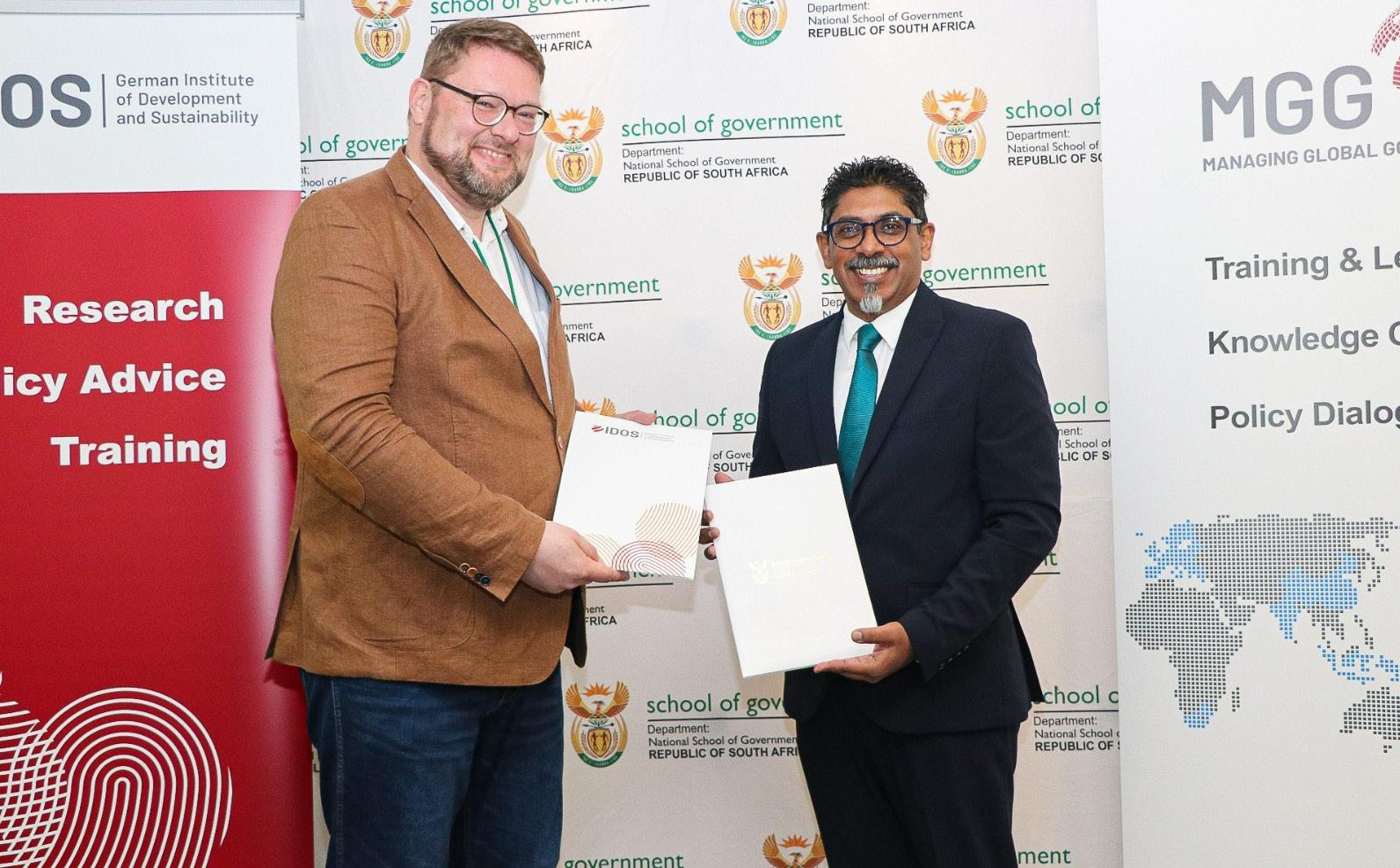

As the year approaches Youth Month, the National School of Government (NSG) in partnership with German Institute for Sustainability and Development (IDOS) hosted a three-day international Conference in Cape Town where local and international delegates discussed initiatives to harness the transformative power of Artificial Intelligence to achieve the Sustainable Development Goals (SDGs) and build public sector capacity for digitalisation.
Delegates were from South Africa and a number of international countries including Germany, China, India, Mexico, Brazil and Indonesia.
The conference started with a masterclass on Artificial Intelligence
as a tool for accelerating the achievement of the SDGs. The hybrid session of the Masterclasswas led by Dr Reevana Balmahoon currently the AI and extended Reality Research Lead at the CSIR.
Dr Reevana mentioned mechanisms to accelerate achievement of the SDG’s including addressing the financing gap, building partnerships and collaboration, localised solutions, leveraging transformation and accelerating the use of technology for good. She also illustrated how AI can assist in planning our everyday lives from planning a trip to designing a selfcare routine.
Dr Kefiloe Masiteng from the United Nations office in South Africa shared South Africa’s experiences
in implementing the 2030 Agenda for Sustainable Development.
Another highlight was the MOU exchange between the NSG and IDOS. The collaboration aims to strengthen the capacity of Schools of Government or Schools of Public Administration to drive the sustainability agenda to ensure that “no one isleft behind”.
This is done through a number of initiatives including the annual participation in the Managing Global Governance Academy (MGG) and Conferences organised by IDOS; Exchange Programmes; Webinars and Masterclasses.
These initiatives convene public sector and civil society professionals from Brazil, China, Germany, India, Indonesia,




“This partnership signals the NSG’s ongoing commitment to use the power of collaboration to bolster efforts of public institutions as uniquely placed institutions to drive transformation and sustainable development in an increasingly complex world”- NSG Deputy Director-General, Dr. Botshabelo Maja
Mexico and South Africa to shape future global leaders.
The second day of the conference was mainly packed with parallel sessions which focused mainly on capacity development for digitalisation and the implementation of the 2030 Agenda.
The Conference concluded with the development of a capacity building action plan for the Schools of Government/Schools of Public Administration to fast-track skilling for digital capabilities to achieve the SDGs.
With only five years left to 2030, progress towards the achievement of the SDGs remains bleak, and capacity for the implementation of the goals need to be accelerated now more than ever. This calls for increased capacity in innovation and Artificial Intelligence.

The National School of Government (NSG) is mandated with the responsibility of ensuring that public servants comply with the provisions of established legislation, regulations and systems, and can exercise proper discretion and innovation in solving routine and complex delivery problems.
To this end, the NSG is tasked with ensuring that all public servants’ participate and complete education, training and development initiatives, as per relevant legislation and Cabinet directives. The NSG is furthermore expected to ensure service delivery impact by supporting institutional performance.
Switchboard: +27 12 441 6000
General facsimile: +27 12 441 6030
Contact Centre: +27 86 100 8326
E-mail Address: contactcentre@thensg.gov.za

In March 2024, South Africa, represented by the South Africa Bureau of Standards (SABS), hosted the African Organisation for Standardisation (ARSO) Technical Committee on Automotive Technology and Engineering (ARSO TC59).
This gathering signifies a notable milestone in the continuous endeavour to standardise
automotive regulations and standards across Africa, with the National Regulator for Compulsory Specifications (NRCS) playing a crucial role by offering technical expertise.
ARSO, mandated to synchronise
African Standards and streamline conformity assessment procedures, aims to diminish Technical Barriers to Trade, fostering both intraAfrican and international trade while catalysing industrialisation across the continent. Within the ARSO framework, the NRCS stands as a beacon of expertise collaboration, driving the standardisation and regulatory framework agenda forward.
ARSO TC59 operates within the ambit of standardising motor vehicles and their components and accessories, in accordance with the parameters outlined in the 1968 Vienna Convention on Road Traffic under the United Nations. Leveraging technical proficiency and strategic collaboration, South Africa, through the SABS and NRCS, actively participates as a Contributing Member in this committee. Its consistent contributions to the formulation of African Standards underscore its commitment to advancing automotive standardisation in Africa.
The recent convening of ARSO TC59 in South Africa, facilitated through collaboration between ARSO and PTB Germany, served as a platform for deliberating the harmonisation of anticipated standards. The meeting provided an avenue for discussing proposed New Work Items from member states, while addressing comments on standards at various stages
of harmonisation. Attended by 17 ARSO Member States, including South Africa, alongside key stakeholders such as the Tripartite Transport and Transit Facilitation Programme (TTTFP) and the African Association of Automotive Manufacturers (AAAM), the event fostered robust dialogue and collaboration.
Aligning with the Safer Vehicles 2025 project by the NRCS, developments within ARSO TC59 resonate with advancements in the South African automotive landscape. Efforts persist to elevate other African nations to comparable standards, with the NRCS actively sharing its expertise on homologation matters and UNECE WP.29 activities and developments.
Ongoing engagements within ARSO TC59 encompass a spectrum of critical topics, including fuel quality, advances in automotive technologies vis-à-vis greenhouse gas emissions and the capacity

of member states to manufacture vehicles and associated automotive products. Additionally, the forum addresses conformity assessment of new vehicles and roadworthiness evaluation of imported used vehicles, among other pertinent issues.
In line with the objectives of the African Continental Free Trade Area (AfCFTA), ARSO TC59 provides a platform for member states and industry associations to exchange experiences identify opportunities and address challenges within the automotive sector. During the recent meeting, South Africa, Morocco and the AAAM shared insights into the future trajectory of the automotive industry in Africa in light of AfCFTA. Representing South Africa, the NRCS offered a comprehensive overview of the local automotive industry's history, status and future prospects.
The culmination of the ARSO TC59 meetings included an illuminating industrial site visit to a local bus manufacturer, providing participants with first-hand insights and fostering greater collaboration and knowledge exchange.
As Africa steers towards automotive excellence, the NRCS remains steadfast in its commitment to driving harmonization efforts, fostering innovation and propelling the continent's automotive industry to new heights. Through collaborative endeavours within ARSO TC59 and strategic partnerships, the NRCS continues to play a pivotal role in shaping the future of automotive standards and regulations in Africa.


ACelebrationofYouth and25YearsofAction
Tomarkthe25thanniversaryofits foundation,SchneiderElectric,the leaderinthedigitaltransformation ofenergymanagementand automation,islaunchingaglobal campaignincelebrationofboth thiskeymilestoneandthenext generationofyoungleaders committedtobuildingafairer, low-carbonsociety.
Founded in 1999 under t he aegis of the Fondation de France, the Schneider Electric Foundation supports changemakers driving sustainable development, promoting social inclusion, and empowering communities worldwide.
Throughout 2024, the foundation will celebrate the world’s youth by raising awareness of their social and environmental impact and mobilising the support of company employees. The high point of these celebrations is the launch of a global call for contributions with the foundation’s social entrepreneurship partner, Ashoka. In Anglophone Africa, the call for contributions will be launched on 22 April 2024.
Ever since its creation, the Schneider Electric Foundation has been a pioneer in supporting positive initiatives to tackle growing social and environmental challenges and many innovations are driven by young people from around the world. The foundation supports them in making an impact for a fairer energy transition and is honoring them on its 25th anniversary.
‘Youth Innovation For A Sustainable Future’: A Global Call for Contributions
The call for contributions titled ‘Youth Innovation For A Sustainable Future’ with Ashoka’s program Changemaker Companies aims to select 25 of the most impactful and innovative youth projects across all five continents (Africa, the Americas, Asia, Europe,

and the Middle East). This global call for contributions focuses on professional engagement and a fair transition, and a 50,000-euro prize will be awarded to the winning project during the COP29 climate summit in Bakou, Azerbaïdjan. Those projects selected will also benefit from increased visibility across the social media channels of both Schneider Electric’s Foundation and Ashoka’s network of countries. In Anglophone Africa, the call for contributions will be launched on 22 April 2024.
“We are honoured and excited to form part of the Schneider Electric Foundation’s milestone 25th year anniversary. Through the Foundation’s ongoing, impactful initiatives such as the Energy Technical Training
“We are honoured and excited to form part of the Schneider Electric Foundation’s milestone 25th year anniversary. Through the Foundation’s ongoing, impactful initiatives such as the Energy Technical Training and New Skills for the Future and Innovation programmes, the youth is encouraged to work towards a sustainable future for all; it’s a tremendous and admirable goal and we look forward to the entries from the African continent.”
- Devan Pillay, cluster president: Anglophone Africa at Schneider Electric
Ashoka is the largest global network of leading social entrepreneurs — individuals with new ideas to systemically address the world’s biggest challenges and the entrepreneurial skill to transform those ideas into national, regional and global social impact. Over 40 years, Ashoka has supported more than 3,800 social entrepreneurs in 90 countries with solutions addressing society’s most pressing issues. Ashoka’s vision is a world in which Everyone is a Changemaker — a society that responds quickly and effectively to challenges, and where everyone has the freedom, confidence and societal support to address any social problem.
For more information, visit: ashoka.org.
Schneider’s purpose is to empower all to make the most of our energy and resources, bridging progress and sustainability for all. We call this Life Is On.
and New Skills for the Future and Innovation programmes, the youth is encouraged to work towards a sustainable future for all; it’s a tremendous and admirable goal and we look forward to the entries from the African continent,” says Devan Pillay, cluster president: Anglophone Africa at Schneider Electric.
In a world where social and environmental challenges are more widespread and more urgent than ever, the Schneider Electric Foundation supports innovative and forward-looking initiatives to give as many people as possible the energy they need to succeed.
Always forward-looking and optimistic, the goal of the Schneider Electric Foundation is to play a part in creating a fairer, less carbon-intensive society that gives future generations the tools to transform our world.
Our mission is to be your digital partner for Sustainability and Efficiency.
We drive digital transformation by integrating world-leading process and energy technologies, end-point to cloud connecting products, controls, software and services, across the entire lifecycle, enabling integrated company management, for homes, buildings, data centers, infrastructure and industries.
We are the most local of global companies. We are advocates of open standards and partnership ecosystems that are passionate about our shared Meaningful Purpose, Inclusive and Empowered values.
Website: www.se.com










Santam initiated the Partnership for Risk and Resilience (P4RR) Programme in 2012 in response to the South African government call for the corporate community to support critical skills development and capacity building within municipalities within the framework of the Business Adopt a Municipality (BAAM).
P4RR is Santam’s flagship programme aimed at building societal resilience through collaboration and partnerships with all spheres of government, state owned entities, research and academic institutions, community-based organisations, private sector agencies to co-create initiatives to enhance institutional capacity of mandated organisations to manage disaster risks focusing on three primary hazards i.e., drought, fires and floods.
The P4RR programme contributes to achieving the Sendai Framework priorities and targets through:
• Conducting community-based risk assessments
• Supporting resilience building efforts
• Strengthening municipal institutional capacity
• Community education and awareness programmes
As a leading short-term insurer, Santam continues to lead efforts to reduce risks and build resilience across the country through partnerships.




95 municipalities


14 municipalities supported since inception participated in the CSIR’s Greenbook rollout.
Over 700 people trained
In firefighting, safety, disaster management and related courses
Climate change adaptation support through the Greenbook
Climate change and variability is impacting South Africa’s disaster risk profile resulting in unprecedented scale of devastation of communities, livelihoods, social infrastructure and insurance losses. Against this background, Climate Change adaptation (CCA) is an integral component of Santam’s P4RR

Over 66 000
people reached with targeted disaster risk education
programme. With this in mind, Santam has partnered with the Council for Scientific and Industrial Research (CSIR), National Disaster Management Centre, Department of Forestry, Fisheries and Environment, Climate and Disaster Resilience Fund (CDRF) to assist selected municipalities to develop CCA plans using the Green Book. The GreenBook is an openaccess online planning support system
that provides scientific evidence to support municipalities in planning and designing climate-resilient, hazard-resistant settlements.Santam, the CSIR and partners have completed development of climate change adaption plans for nine districts and one metro in 2023.
The GreenBook also provides appropriate adaptation measures that can be implemented in cities and towns, so that South African settlements are able to minimise the impact of climate hazards on communities and infrastructure, while also contributing to developmental goals.
Emerging P4RR outcomes and high-level insights illustrate the positive impact of the programme
A 2022 independent study revealed that the P4RR programme is making a positive contribution to disaster risk management in South Africa and most significantly, it is doing so in areas of systems failures, plugging important gaps. These contributions include institution strengthening and capacity building, the forging of new relationships and modalities for stakeholder cooperation and prompting innovation in the sector.
P4RR outcomes and unique value-add
The review outcomes showed that P4RR is making a positive contribution to disaster and risk management in South Africa. Perhaps more significantly, it is doing so in areas of system failures, plugging important gaps. These contributions include institutional strengthening, capacity building and forging new relationships. The P4RR programme has significantly enhanced disaster management and fire services capacity for its partner municipalities and agencies over
the past 10 years. While the P4RR programme continues to partner with new municipalities, its focus is evolving to explore measures to deepen the impact and sustainability of its interventions (depth as opposed to breadth).
Santam, together with its partners, have learned these important lessons from the implementation of the P4RR programme:
• Importance of linking initiatives to mandated organisations
• Alignment of programmes to existing initiatives and programme
• Adopting a targeted approach to optimise impact
• Collaborative approaches integral to public- private partnerships
• Importance of co-funding of initiatives in sustainability of initiatives
• Partnering/collaborating a district and metro level.
“The P4RR programme has made effective strides towards building resilient communities. It has over the past 10 years evolved into a holistic programme that addresses prevalent disaster risks such as fire, flood and drought. We have partnered with municipalities and other spheres of government and civil society to co-create solutions that are impactful. At Santam, we strive to help communities better manage their disaster risks. As a responsible corporate citizen of South Africa, we are proud of our programme, which fosters sustainable economic development and safer communities.”
- Tavaziva Madzinga, Santam Group CEO.








Established in 2017 in response to the #FeesMustFall student-led movement, which exposed the high cost of obtaining a university degree in South Africa.
Along with our founding partner Standard Bank, Feenix rallies a diverse community to transform the lives of students and their families. We achieve this through a secure Crowdfunding platform where students actively raise funds for their education and through partnerships with forward-thinking businesses, where we manage Skills Development Bursary programs on their behalf. We also provide holistic support, including financial literacy, job readiness, and personal mastery education, to empower young people to thrive.
4121
Total number of students impacted from 2017 to September 30, 2023
R186.29m
Total funds raised from 2017 to September 30, 2023
Over the past six years, 3,810 lives have been positively impacted, thanks to the unwavering commitment of Standard Bank South Africa (SBSA). SBSA's dedication to advancing social, economic, and environmental progress led to the creation of Feenix, with their employees playing a key role in shaping the future of our nation. This impact is a testament to SBSA's invaluable contribution.
https://feenix.org/

In South Africa, education outcomes have long been a focal point, and After School Programmes (ASPs) have emerged as key contributors to bridging the gaps across various levels of education.
Earlier this year, Minister of Basic Education Angie Motshekga hailed the 2023 matric pass rate of 82.9%, as 'extraordinary'. Yet, many learners who began school in 2012 never reached matric. 40% disappeared from the system, suggesting that the actual pass rate is around 55%.
Research indicates that due to challenges faced by quintile 1 to 3 schools, it takes a South African child, on average 15 years to complete matric. These challenges include overcrowded classrooms, and the lack of learners’ foundational knowledge.
The international benchmark, Progress in International Reading Literacy Study (PIRLS) revealed that 81% of learners in grade 4 cannot read for meaning.
Learners aren’t keeping up with the school curriculum, and teachers don’t have the capacity to provide the necessary individual attention. The result is low performance and increased dropout rates.
ASPs are beacons of hope for learners, parents, and schools. They serve learners in under-resourced schools, during the after-school time and on weekends. While they can't solve educational challenges overnight, they play a crucial role in providing
learners with the foundational skills they need to thrive both academically and personally.
The Learning Trust (TLT) has been developing the after-school sector in South Africa for over a decade, providing funds and capacity support to hundreds of ASPs nationwide, offering a diverse array of extended learning programmes, ranging from academic support to sports and recreational activities.
In 2021, in partnership with Allan Gray Philanthropy South Africa (AGGPSA) and Tutuwa Foundation, the Catch-up Coalition was launched. This coalition involves 50 implementing partners across the country and includes impressive organisations driving outcomes through innovation. One example is Lefa Cooperative Ltd, a social enterprise that uses the Telegram app to provide virtual tutoring to high school learners. Programme ambassadors and activators visit schools to raise awareness and help learners sign up, and tutors provide remote support.
Successful ASPs benefit from strong partnerships with local schools. Having the school buy-in, increases the ability of ASPs to supplement what is being done in the school time. Working together helps integrate social-emotional learning, life skills development to offer a more holistic approach to education.
Masinyusane Development, an ASP based in Gqeberha, emphasises the importance of teacher involvement. They advocate for empathy, understanding, and flexibility in navigating challenges together.
Importantly, Masinyusane’s approach is to support educators and schools rather than to compete with them. Their model helps assess learner’s literacy levels and offers ASPs to build literacy from there. The schools’ benefit from increased learner competencies and more proactive and engaged learners. Teachers are then able to move through the curriculum at pace.
The Department of Education (DoE) could do far more to
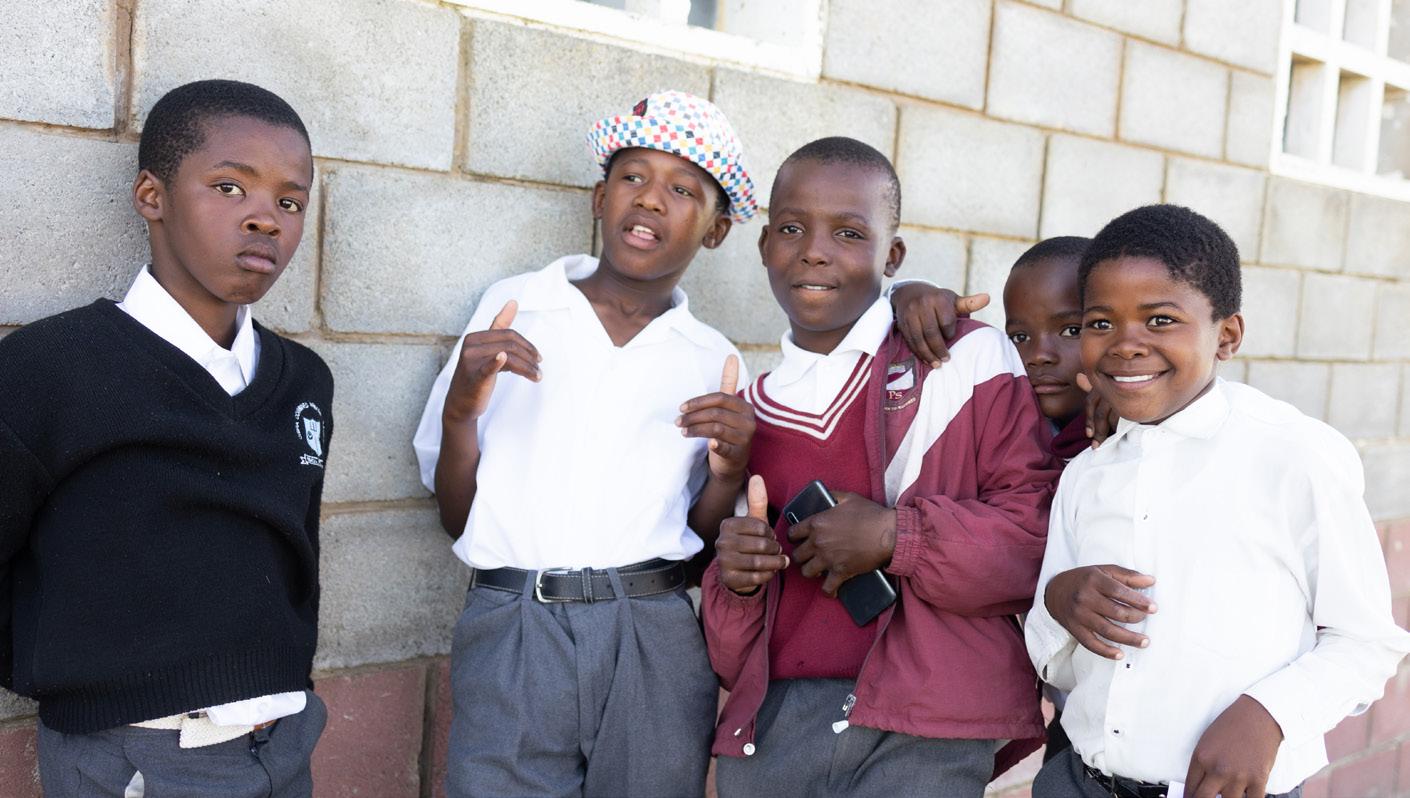

recognise the key role ASPs play in supplementing traditional education. With departmental support at all levels, schools would be more likely to embrace ASPs and develop meaningful partnerships to serve their learners with vital extra support.
The learning trust is developing south africa’s extended learning sector through the provision of funding and guided organisational support to after school programmes that work to improve educational outcomes of young people living in poverty and exclusion.
Schools and ASPs have the same objectives: to develop learners into productive, happy citizens. While schools often see the value of ASPs, there needs to be more commitment from the DoE to recognise and enable schools to partner with ASPs in their provinces, districts, and circuits.
The Learning Trust will continue to support ASPs who empower learners, bridge educational gaps, and unlock the potential of South Africa's future leaders. Now, more than ever, we need government partnerships to empower schools and communities in utilising ASPs for improved learner outcomes.
Tel: 021 709 0420
Website: www.thelearningtrust.org
Email: info@thelearningtrust.org
Address: 173 Oxford Road, Rosebank, Johannesburg, 2196
In the dynamic landscape of waste management and recycling, MetPac-SA stands as a beacon of success, particularly in the realm of metal packaging. As the Producer Responsibility Organisation (PRO) focused on metal packaging in South Africa, MetPac-SA has achieved significant milestones in promoting the collection and recycling of metal packaging materials, ranging from aerosol canisters to aluminium beverage cans and ferrous food packaging.
MetPac-SA's commitment to understanding the material flow of aluminium beverage containers through a Material Flow Analysis (MFA) exemplifies its dedication to informed decision-making. By updating the MFA annually, MetPac-SA gains crucial insights into the local market dynamics, identifying areas for improvement and optimizing recycling processes.
In addition to data-driven initiatives, MetPac-SA has invested in educational outreach through the "Plant the Seed" video series, emphasizing the importance of recycling and metal recovery. These videos serve as catalysts for raising public awareness and fostering a culture of sustainability.

MetPac-SA, a leading advocate for sustainable metal packaging solutions, is thrilled to announce its pivotal role as the lead sponsor of the innovative new series of videos about recycling and the importance of creating a circular economy that was developed by "Plant the Seed" – an organisation and social enterprise that assists businesses, schools and communities with their recycling and waste management solutions.
Explains Thomas Chevallier, Director at Plant the Seed: “Our brandnew and dynamic series of four videos are not just about waste and recycling – it’s a journey towards empowerment where every citizen learns to be a steward of the environment right from their home. The videos are engaging and informative and aim to create a blueprint for a sustainable tomorrow”.
Kishan Singh, CEO of MetPac-SA, says the Producer Responsibility Organisation (PRO) for the metals packaging industry felt strongly about supporting the Plant the Seed videos, as education is key to driving positive change towards a more sustainable future.
“This project aligns seamlessly with MetPac-SA's dedication to contributing significantly to the circular economy, sustainable development, and the creation of resilient ecosystems. Ongoing education is key and this series of videos succinctly explain the 'what, why, and how' of recycling in a way that is timeless and easy to understand by audiences of all ages and backgrounds,” Singh says.

Each video will offer practical insights and actionable tips for incorporating recycling into daily routines. From understanding the importance of segregating waste to exploring innovative recycling technologies, the series will cover a diverse range of topics designed to empower viewers to make informed choices that benefit both the environment and society at large:
• Episode 1 – Waste hierarchy
• Episode 2 – Separation at Source
• Episode 3 – Plastic
• Episode 4 – Tin and Metal
The video series will officially be launched on various platforms (Instagram, LinkedIn and Youtube) throughout the month of May 2024. Although only one of the videos focus specifically on the recycling of metal packaging, MetPac-SA felt it was important to support the making of all the videos in an effort to encourage individuals and communities alike to adopt environmentally conscious behaviours and embrace the principles of the circular economy.
“We would like to offer our sincere thanks and gratitude to MetPac-SA for collaborating with Plant the Seed and for their faith in our project. It would be impossible for us to execute our mandate without the support and buy-in of industry leaders who help amplify our message of sustainability. Together, we can catalyse widespread awareness and action towards building a more sustainable world,” Thomas concluded

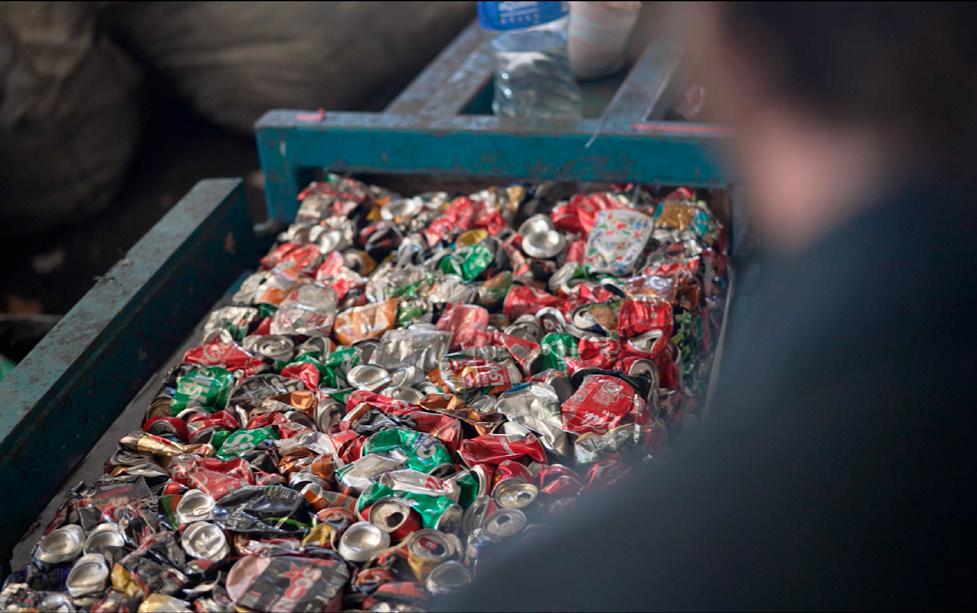


Navigating the complexities of Extended Producer Responsibility (EPR) regulations has presented formidable challenges for MetPac-SA. From aligning reporting cycles with member timelines to grappling with fluctuating EPR fees, the organisation has encountered hurdles along the way. However, through proactive engagement with stakeholders and meticulous planning, MetPac-SA has managed to streamline processes and ensure compliance with regulatory requirements.
MetPac-SA's partnership with GeT Metal and Waste, a specialist recycler of all types of ferrous and non-ferrous metals with an impressive footprint consisting of 8 branches throughout the Western Cape, has yielded innovative approaches to waste characterisation and provided valuable insights into the composition of recyclable materials. By conducting indepth assessments over several months, MetPac-SA has gained a nuanced understanding of the materials being processed, thereby paving the way for targeted interventions and optimisation
of recycling infrastructure.
MetPac-SA understands the power of collaboration in driving sustainable change. By partnering with other PROs and government bodies, such as PETCO and Polyco, MetPac-SA has managed to successfully expand its reach and effectiveness in meeting recycling targets. Through joint initiatives like onboarding additional buy-back centers and supporting waste picker payment systems, MetPac-SA fosters a holistic approach to recycling, engaging stakeholders across the value chain.
MetPac-SA has also supported various awareness and education campaigns aimed at educating pupils and consumers alike about the importance of recycling, effective waste management and supporting a circular economy. They are the lead sponsor of the Trash 4 Treats schools programme that encourages impoverished schools to collect metal packaging in their neighbourhoods and surrounding areas, rewarding the winning schools with cash prizes that can be used for much-needed school upgrades and
the winning grades who participated in the collection efforts with treats, as well as a supporter of the Miss Earth SA foundation who visits schools to promote the message, “Waste stops with me”.
MetPac-SA employs a robust system of quarterly declarations from its members to track material placed on the market. This data, coupled with insights from partner networks, enables MetPac-SA to evaluate its performance against government-mandated recycling targets accurately. With a keen focus on transparency and accountability, MetPac-SA drives continuous improvement in recycling outcomes.
Looking ahead, MetPac-SA remains steadfast in its commitment to advancing metal packaging recycling efforts and contributing to a more sustainable circular economy. By increasing local recycled content in aluminium beverage cans and expanding collection and recycling infrastructure nationwide, MetPac-SA aims to drive lasting change. Moreover, the rollout of waste picker payment systems underscores MetPac-SA's dedication to fostering inclusive and equitable recycling practices, empowering communities and driving positive social impact.
In conclusion, MetPac-SA's journey exemplifies the transformative power of collaboration, innovation, and unwavering commitment to sustainability. As a driving force in the recycling landscape, MetPac-SA continues to inspire change, paving the way for a brighter, greener future for South Africa and beyond.





Households and businesses are adopting alternative sources of energy as load shedding bites. What may not be well known is that many municipalities are in the game too, providing off-grid energy sources to the poorest households.
The Free Basic Alternative Energy (FBAE) policy instructs municipalities to supply alternative sources of energy to poor households that are not connected to the grid. The policy was introduced to aid predominantly rural municipalities that struggled to provide Free Basic Electricity (FBE) to a relatively high number of indigent households in unelectrified areas. The policy lists several alternatives, such as coal, liquefied petroleum gas, bio-ethanol gel (or fire gel) and paraffin.
Although not specifically listed, municipalities also provide solar home systems.
Stats SA tracks the municipal rollout of alternative sources of energy in its annual Non-financial
census of municipalities statistical report. The agency covered the 2017 data in a summary article published in 2018. The most recent release provides a 2022 update for data on solar, fire gel and paraffin.
The maps below show where these services are provided. Of South Africa’s 257 municipalities, 21 municipalities across 7 provinces supplied solar home systems to 149 919 households (Figure 1). This is up from 113 197 households in 2017.
The Ekurhuleni Metropolitan Municipality in Gauteng provided solar home systems to the largest number of households in 2022, followed by Alfred Nzo District Municipality in Eastern Cape and Sol Plaatje Local Municipality in Northern Cape.
Of particular interest is the concentration of municipalities in the northern parts of Eastern Cape, where two administrative levels provide the service across the same area. Alfred Nzo District Municipality, as well as its four local municipalities, are all actively involved in rolling out solar home systems. >
1. Ekurhuleni MM (GP)
2. Alfred Nzo DM (EC)
3. Sol Plaatje LM (NC)
Matatiele LM (EC)
Moqhaka LM (FS)
Fetakgomo Tubatse LM (LP)
Elundini LM (EC)
Mbhashe LM (EC)
Rand West City LM (GP)
Winnie Madhikizela-Mandela LM (EC)
Dr. AB Xuma LM (EC)
Umzimvubu
Alfred Duma LM (KZN)
!Kheis
Ulundi LM (KZN)
Stellenbosch
Dawid Kruiper LM (NC)
Maphum≠ulo
(KZN)
Ntabankulu LM (EC)
Dr. Beyers Naude LM (EC)
Thulamela LM (LP)

Fire gel is another off-grid energy alternative. In 2022, 7 municipalities supplied fire gel to 9 702 households in KwaZuluNatal and Eastern Cape (Figure 2). This is much lower than the 19 607 households that benefitted from the service in 2017.
The use of paraffin by South African households in general has declined over the years, according to census data from 1996 to 2022. In 1996, 21,6% of all households used paraffin as a source of energy for cooking, falling to 8,5% in 2011 and further to 2,7% in 2022.
Municipal support programmes have also scaled back in this regard. In 2022, 11 municipalities supplied paraffin to 22 421 households (Figure 3), lower than the 86 522 households in 2017.
Several municipalities provided other alternative sources of energy, such as coal, liquefied petroleum gas and candles. In the report, these sources are grouped into the category ‘other’ and include a total of 11 248 households: 10 910 in 5 Eastern Cape municipalities and 338 in 1 Northern Cape municipality.
In summary, of the three main alternative sources of energy measured, municipalities have increased their supply of solar systems to assist poorer households, while fire gel and paraffin have become less prominent.
More articles of this nature, and reports that focus specifically on municipal data, can be found on the Statistics South Africa website: www.statssa.gov.za
Authors: Malibongwe Mhemhe, Celia Mamabolo and Kevin Parry
1. Dr.
2. Inkosi Langalibalele LM (KZN)
3. Ndlambe LM (EC)
4. Elundini LM (EC)
5. Ulundi LM (KZN)
6. Enoch Mgijima LM (EC)
7. Umzumbe LM (KZN)
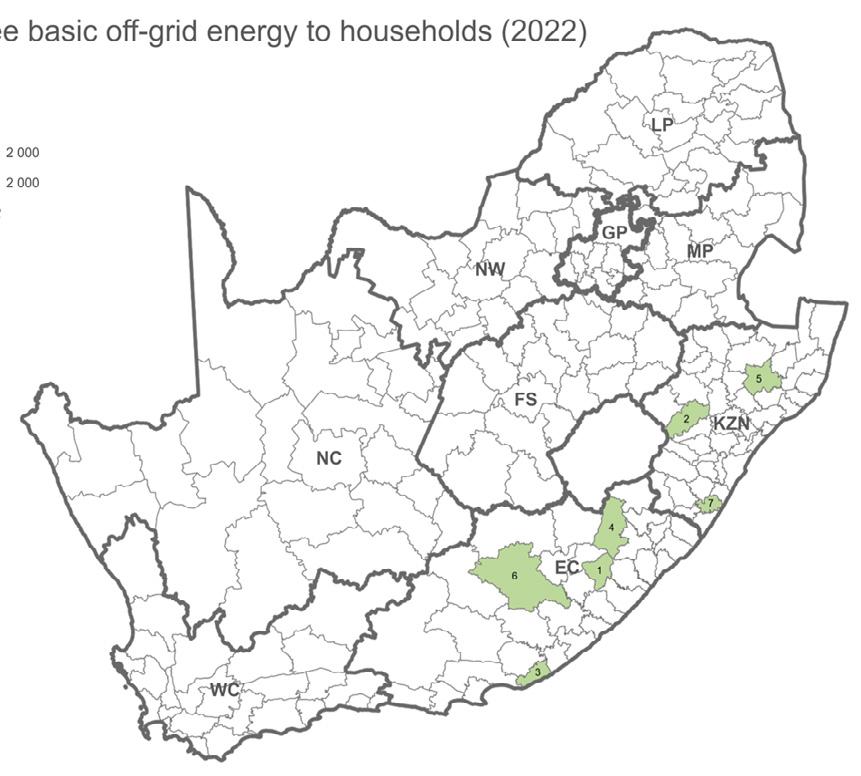
2.
3. Umzumvubu LM (EC)
4. Mhlontlo LM (EC)
5. Mnquma LM (EC)
6. Senqu LM (EC)
7. Sakhisizwe LM (EC)
8. Raymond Mhlaba LM (EC)
9. Ntabankulu City LM (EC)
10. Great Kei LM (EC)
11. Ubuntu LM (NC)


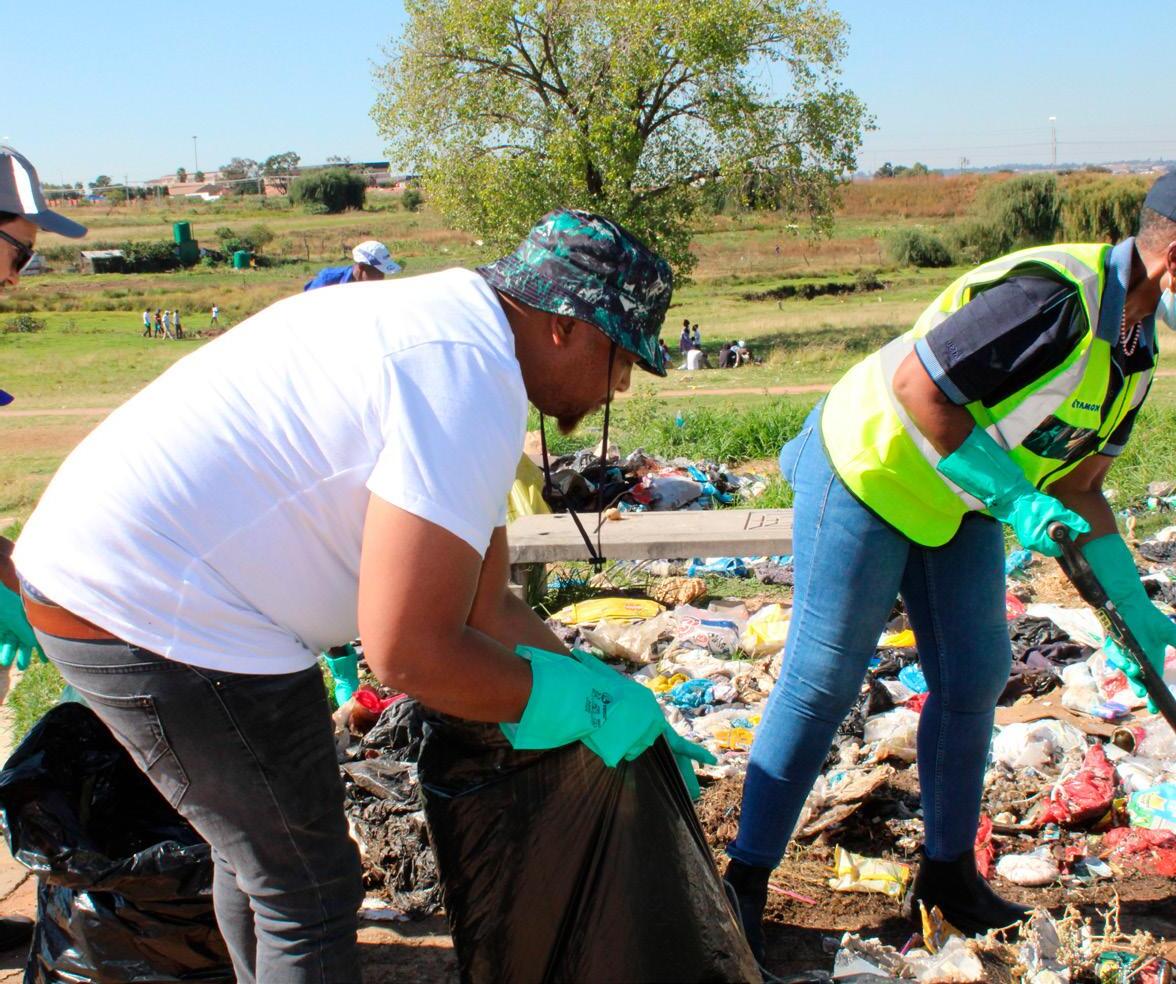



At Komatsu, we believe every action, however small, makes a difference and takes us one step closer to creating a sustainable future where people, business and the planet thrive together.
To this end, Komatsu employees worldwide participate in various activities to protect the environment and promote sustainability.
Recently, Komatsu South Africa collaborated with a community organisation, Envirocare, to conduct a clean-up campaign in Tembisa, in the City of Ekurhuleni, Gauteng province. EnviroCare has been very involved in clean-up campaigns in and around Tembisa, clearing illegal dumping sites and planting trees. The purpose of the organisation dovetailed well with Komatsu’s commitment to cleaner and greener environments and a new partnership was born.
On the 19 th of April 2024, employees from Komatsu’s Head Office in Germiston went to Thami Mnyele Heritage Park in Mkhathini section in Tembisa to clean up an illegal dump site. Over the years, the park has been turned into a dumping side and did not look like a park anymore. Staff came with their refuse bags and gloves and loads of positive energy –determined to make a difference.
Within 2 hours the park already looked different. Komatsu employees collected more than 200 bags of rubbish from the park, which were then collected by the local municipality.
The social and external environment surrounding us is changing every moment and the preservation of our natural environment is one of the most urgent and significant issues to be addressed worldwide if we are to ensure a sustainable future for generations to come.
We will continue to support campaigns in Tembisa and other communities in which we operate, creating value together.

A trusted custodian who grows your investments for a secure retirement.


The National Fund for Municipal Workers (NFMW) is the largest fund in Local Government with approximately R30 billion in assets under management, serving a membership base of more than 56 000 (EMPLOYEES AND COUNCILLORS) across South Africa.
With a steadfast commitment to our members, we prioritise their needs in every decision and strategy we implement. Our dedication to excellence ensures minimal administration costs, maximising contributions towards retirement savings.
Achieving excellent long-term investment performance, puts us on par with the best global portfolios and ahead of our peers in Local Government. Recognised with numerous Institute of Retirement Funds Africa Best Practices Industry Awards, we set the benchmark for excellence in the retirement fund sector.
At the NFMW we go beyond financial support, offering comprehensive personal financial planning, retirement benefit counselling, and a unique health and wellness program for members and their families.
With our unwavering commitment to good governance, impactful investing yielding financially sound returns, care for our members, and responsible leadership, the NFMW assures unparalleled value to all our members.
Our focus remains on continuing to provide exceptional service to our members, ensuring their financial security and well-being. We aim to further improve our member value proposition to meet the evolving needs of our members and continue to contribute to socio-economic prosperity in various ways to positively impact the lives of our members, their families and communities today and tomorrow!


GET TO KNOW THE NEW MAYOR OF EKURHULENI

Inaugural SOCA 2024
MEGA REGIONAL WASTE MANAGEMENT FACILITY FOR MOSSEL BAY
GARDEN ROUTE SKILLS MECCA PROGRAMME
KING CETSHWAYO DISTRICT MUNICIPALITY
Serious about service delivery
CITY OF MBOMBELA
Hands over life-changing projects to communities
SUNDAYS RIVER VALLEY MUNICIPALITY
Is the greenest municipality in Eastern Cape






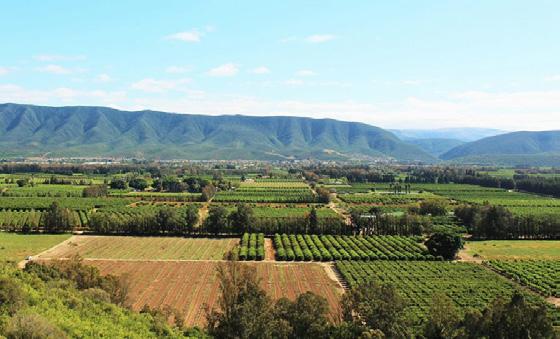

Born and bred in eastern metro of Gauteng, the new mayor of the city of Ekurhuleni is neither new to politics nor new to the politics of the metro.
The City of Matlosana Municipality is situated approximately 164 km South West of Johannesburg, strategically located on the N12 Treasure Route, which is the North West Province’s primary tourism corridor.
Mayor Nkosindiphile Doctor Xhakaza comes from humble beginnings.
Raised in the Lebeong Section of Thembisa, he pursued his education at Inxiweni Primary School and later at Masiqhakaze Secondary School.
The scenic N12 starts from Mpumalanga and is the gateway to the Western Cape Province. The route takes you from eMalahleni, to the vibrant Gauteng Province and the Sterkfontein Cradle of Humankind World Heritage Site, and continues to Potchefstroom, Klerksdorp, Kimberley, Beaufort West, up until George.
He later went on to further his studies and received a National Diploma in Cost and Management Accounting (Cum Laude) from the Vaal University of Technology and a Postgraduate Diploma in Public Management from Regenesys.
His career in public service began in 2011 as a PR Councillor in Ekurhuleni Metropolitan Municipality, where he later became the Deputy Chief Whip for the ANC Caucus, contributing significantly to municipal affairs and service delivery.
It is the Transformation of the N12 Treasure Route that has unlocked regional opportunities and resulted in massive activity and mobility along the Matlosana portion of the corridor. It has a multi-dimensional character that has created employment, enhanced commuter movement, enhanced investment opportunities, increased economic activity, etc.
WHY VISIT THE CITY OF MATLOSANA?
Create unforgettable memories at our quality business and leisure accommodation venues which include conferencing, wedding and spa facilities. The City has a wealth of attractions for visitors:
• Adventure tourism
• Wildlife tourism
Xhakaza has played a pivotal role on several crucial Section 79 committees, including the Transport Planning and Provision Oversight and the Oversight Committee on the Mayor’s Office and Legislature, where he monitored institutional and governance performance. As the Member of the Mayoral Committee (MMC) for Water and Energy, and subsequently for Finance, Economic Development, and ICT, Xhakaza steered strategic initiatives targeting critical infrastructure and financial health.
• Medical tourism
• Wellness tourism
His leadership contributed to
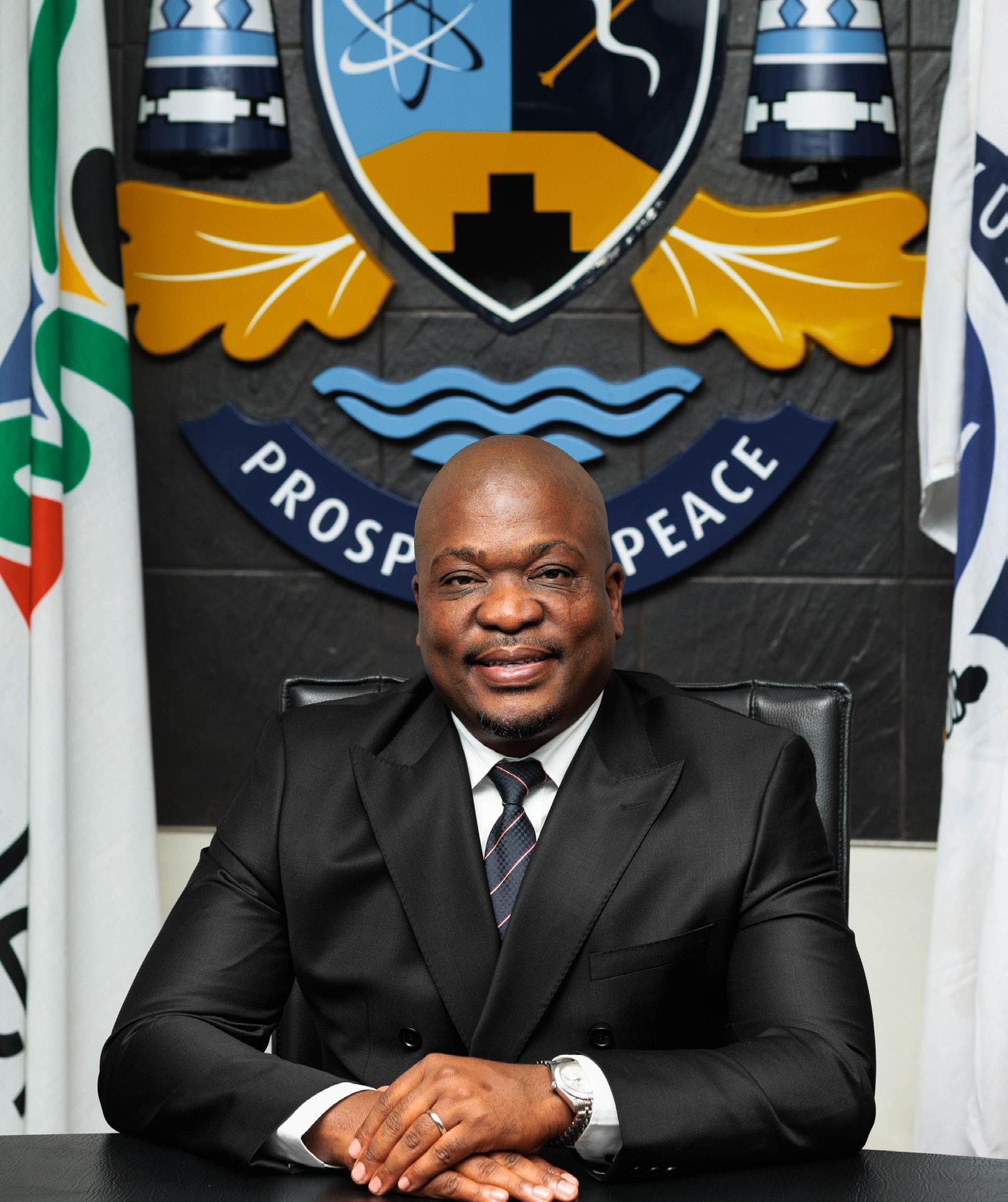
significant milestones, such as receiving a Clean Audit Opinion for the 2019/2020 financial year.
More recently, in his roles as leader of Executive Business and MMC for Corporate and Shared Services and Service Delivery Coordination, Xhakaza has been dedicated to driving operational enhancements, fostering economic expansion, and
To us health care is of paramount importance as a healthy city is productive and constitutes prosperity. We boast well-developed medical facilities, which enhances and promotes the competitive advantage of Matlosana as a major Medical Hub in the North West Province. Services include: general and private medical fascilities, casualty/trauma and dental services. Most clinics focus on primary health care services.
the latest MRI scanner at the radiology unit.
upholding clean governance. His efforts are consistently supported by a steadfast dedication to social justice and a commitment to excellence in service delivery.
PRIME LAND FOR DEVELOPMENT
N12 Development Route was identified by the municipality as a flagship project for golden opportunities in the following sectors: housing, business, industrial, heritage, mining, tourism, sport as well as recreation.
It goes beyond doubt that Mayor Xhakaza brings a wealth of experience and a strong leadership background to his role as the Mayor of the City of Ekurhuleni.



Agriculture is one of the mainstays of Matlosana, which proudly boasts a region rich with agricultural potential. The emphasis is focused on field crops, such as maize, wheat, sorghum, sunflowers, etc... (climatically suitable with a 70% probability of production success).
On Tuesday 30 April 2024, just two weeks after assuming office, Mayor Xhakaza delivered his maiden State of the City Address (SOCA).
“This State of the City Address is delivered 30 years into our democracy. Therefore, this speech must give fresh hope to the millions of people who have continuously looked up to us to deliver a better life for all the citizens of Ekurhuleni.
Aside from attracting investment, the N12 Treasure Route connects communities to the economic hub of Matlosana City. The improved road infrastructure changes the lives of the City’s citizens making it easier to access employment opportunities and other services.
“As we reflect on the past 30 years as a country, we must take the best lessons forward and demonstrate that we have learnt from our past,” the mayor said.
Democratic Party, the Freedom Front Plus and the Patriotic Alliance.
It gives us a distinct advantage in understanding the real challenges facing communities across the city. As a result, we are well placed to resolve the service delivery and financial quagmire we encountered when we acceded to office barely four months ago. That understanding will be reflected in the programmes and priorities we lay out today.”
1. Giving residents back their power by helping to reduce their vulnerability to Eskom load shedding; enhance access to reliable, affordable, and sustainable electricity.
2. Ensuring that every community has access to reliable, clean, running water, that is safe to drink and to prepare food; that we modernise water management and prevent untreated wastewater contaminating the environment.
NATIONAL FRESH PRODUCE MARKET
Shoppers can also be spoiled for choice between Matlosana Mall, City Mall, Flamwood Walk Shopping Mall, Tower Mall and other leading shopping centres in Matlosana.
He was elected mayor under very trying circumstances, that go in line with his view of ‘having been tested in the fire of politics’ because the coalition that that he emerged to lead spent days debating and thrashing out agreements on how to take the metro forward.
Reflecting on the complications of the coalition in his speech Mayor Xhakaza said: “It is an honour that I share with the Multi-Party Coalition Government of the City of Ekurhuleni. This unique moment in history is one we don't take for granted. Our coalition is as diverse as the communities we serve. It comprises of representation from the Democratic Alliance, Action SA, the Inkatha Freedom Party, the Congress of the People, the African Christian
“The City of Ekurhuleni will embark on a major campaign to reclaim hijacked buildings in different parts of the municipality.”
- Mayor Xhakaza
Agriculture is one of the mainstays of Matlosana, which proudly boasts a region rich with agricultural potential. The emphasis is focused on field crops, such as maize, wheat, sorghum, sunflowers, etc...
3. Investing in safe, reliable, affordable public transport; well-maintained roads; and infrastructure renewal with measures to safeguard infrastructure from vandalism and theft.
The Market is the property of the City of Matlosana and was established in 1980 and it is ranked 8th out of 17 Fresh Markets in the country according to turnover.
In his typical straight talk and nononsense approach, the mayor of Ekurhuleni acknowledged the financial woes plaguing the metro and committed to the coalition’s plans to ‘pull out all stops’ in its service delivery drive.
“I have chosen the theme for the first State of the City Address of this administration: "Back to Basics for Service Delivery and Inclusive Growth”, Mayor Xhakaza explained. He added: “Our priorities under this theme can be summarised in nine points, drawn heavily on our Coalition Administration:
4. Ensuring there is a hygienic environment to live and play, delivered through effective waste collection and waste disposal, working landfill sites, the implementation of recycling programmes through reclaiming of untidy public parks and cemeteries.
With five Market agents, the market supplies customers as far as Botswana, Kimberly and Vryburg.
CONTACT DETAILS
5. Promoting housing options, ensuring more people own their homes by receiving their valid title deeds.
Address: Cnr Braamfisher & OR Tambo Streets, Klerksdorp
Tel: 018 487 8000/ 018 487 8800
6. Being tough on crime and tougher on the causes of crime by investing in localised law enforcement.
Email: communications@ klerksdorp.org
CityofMatlosanaUpdates @MatlosanaCom Cityofmatlosanamunicipal
7. Minimising the risks which lead to poor health, respond effectively to health emergencies, and promote the resilience of communities through effective disaster risk management.

8. Regaining the financial stability of the city by ensuring good governance.
The City of Matlosana Municipality is situated approximately 164 km South West of Johannesburg, strategically located on the N12 Treasure Route, which is the North West Province’s primary tourism corridor.
9. Using Back to Basics service delivery as a foundation to bringing in investment and jobs to the local economy by making it easier to do business within the municipality.
• Creating 8,000 opportunities through the Expanded Public Works Programme.
• Training 1,000 community members through Seta and Gauteng Provincial programs.
Committee with preliminary decisionmaking powers and investigate the conversion of existing structures into VIP desks for prestige development projects.”
The scenic N12 starts from Mpumalanga and is the gateway to the Western Cape Province. The route takes you from eMalahleni, to the vibrant Gauteng Province and the Sterkfontein Cradle of Humankind World Heritage Site, and continues to Potchefstroom, Klerksdorp, Kimberley, Beaufort West, up until George.
• Providing vocational skills training to 1,200 community members.
The Mayor’s view on returning back to the basics of service delivery received numerous accolades from most of the Coalition Partners.
One of the leading Coalition members said: “I wish to commend the mayor on embracing our principles of Back to Basics, I cannot help but notice the legacy and blueprint for good governance and the vision of the multiparty coalition woven through.”
It is the Transformation of the N12 Treasure Route that has unlocked regional opportunities and resulted in massive activity and mobility along the Matlosana portion of the corridor. It has a multi-dimensional character that has created employment, enhanced commuter movement, enhanced investment opportunities, increased economic activity, etc.
“We welcome the Mayor’s 'tough stance' on crime and corruption,” another member said.
WHY VISIT THE CITY OF MATLOSANA?
Another one added: “It is great to note that the Mayor’s commitments are not his alone, but those of both the coalition and the IDP process – and if we stick to them, the city will move forward."
Create unforgettable memories at our quality business and leisure accommodation venues which include conferencing, wedding and spa facilities. The City has a wealth of attractions for visitors:
• Adventure tourism
• Wildlife tourism
• Medical tourism
The city aims to create 16,000 jobs and maximize youth skills development for 4,300 young people. The establishment of the Ekurhuleni Skills and Bursary Fund, in partnership with SETA and the private sector, is underway. This initiative includes:
• Wellness tourism
Mayor Xhakaza continued: “To create employment opportunities we want to make it ‘easier to do business’ with and in the city, we are hopeful that the electronic processing of all development applications and process will soon be available on an online platform. Our grand objective is to, by the end of the political term in 2026, have facilitated at least R50bn of investment into the City of Ekurhuleni.
Create unforgettable memories at our quality business and leisure accommodation venues which include conferencing, wedding and spa facilities.
He added:” We also plan to initiate an Online Investment Facilitation system. Our targets for the next financial year are to create 10 000 work opportunities, R100m in grant funding, R24m in rental revenue through municipal trading places and the empowerment of 500 SMMEs and cooperatives.”
“The Multi Party Coalition has also resolved that the City of Ekurhuleni must commence reviews of the Aerotropolis Initiative, the Economic Development Strategy and the Growth and Development Strategy 2055 for any updates that are required.”
“In this government I am Honoured to lead, it is clear that political stability will be the cornerstone for the remainder of the current term of office, which will be characterised by quality, sustained and equitable service delivery." - Mayor Nkosindiphile Xhakaza
MATLOSANA AS A MEDICAL HUB
To us health care is of paramount importance as a healthy city is productive and constitutes prosperity. We boast well-developed medical facilities, which enhances and promotes the competitive advantage of Matlosana as a major Medical Hub in the North West Province. Services include: general and private medical fascilities, casualty/trauma and dental services. Most clinics focus on primary health care services.
“Our approach will be to improve investor relations, re-engineer and optimise investment transmission and decision-making. We will do this by empowering the Ekurhuleni Investment
Mayor Xhakaza concluded: “The road ahead will not be an easy one. MultiParty Coalition Governance is not an easy form of democracy. It requires teamwork, patience, and resilience. It will require us to fight for the idea of a government that works for its residents.
The city prides itself on having five private hospitals, two government hospitals, including the largest state hospital in the North West Province and 15 clinics including mobile clinics. It also boasts the only fully contained oncology unit in the North West Province, which offers a comprehensive service at four pathological laboratories and has the latest MRI scanner at the radiology unit.
“Such a turning point in history, reminds me of the inspirational words of the late anti-apartheid activist, Helen Suzman who once said: "I stand for simple justice, equal opportunity, and human rights. The indispensable elements in democratic society – and well worth fighting for."
N12 Development Route was identified by the municipality as a flagship project for golden opportunities in the following sectors: housing, business, industrial, heritage, mining, tourism, sport as well as recreation.
“Our Multi-Party Coalition wants this city to work. And that's how we get the city moving forward. I want this city to work.”

Agriculture is one of the mainstays of Matlosana, which proudly boasts a region rich with agricultural potential. The emphasis is focused on field crops, such as maize, wheat, sorghum, sunflowers, etc... (climatically suitable with a 70% probability of production success).
Aside from attracting investment, the N12 Treasure Route connects communities to the economic hub of Matlosana City. The improved road infrastructure changes the lives of the City’s citizens making it easier to access employment opportunities and other services.

Shoppers can also be spoiled for choice between Matlosana Mall, City Mall, Flamwood Walk Shopping Mall, Tower Mall and other leading shopping centres in Matlosana.
The Local Municipalities of George, Mossel Bay, Knysna and Bitou are currently using a privately owned Petro SA site as a waste facility. This facility has reached its useful life and there is no other suitable facility in the region that can accommodate these municipalities.
In response to this pressing issue, the Garden Route District Municipality (GRDM) is constructing a game-changer Regional Waste Management Facility in Mossel Bay to accommodate these municipalities.
As per Section 84 (1)(d) (iii) of the South African Local Government: Municipal Structures Act 117 of 1998, as amended, the GRDM is responsible
The emphasis is focused on field crops, such as maize, wheat, sorghum, sunflowers, etc...
for the establishment, and control of waste disposal sites, bulk waste transfer facilities and waste disposal facilities for more than one local municipality in the area.
It therefore makes sense for the GRDM to pursue this mega project. It is planned for the facility to include a Class B general waste cell and a Class A hazardous waste cell. Both these will include the associated composite liner systems, drainage systems and ancillaries as required by the National Environmental Management Waste Act, Act 59 of 2008 and the Norms and Standards for Disposal of Waste to Landfill (R636 of 23 August 2013). The general waste cell will have a lifespan of


approximately 20 -25 years, based on the current waste disposal rates. The licensed project site includes available space for future cell development that could reach an estimated lifespan of an additional 32 years - should the need arise.
Further provisions have been made for an area that will include a materials recovery facility (MRF), a composting area and an area for the processing of construction and demolition waste (builder’s rubble). Other infrastructure like roads, storm water pipelines, a leachate storage dam, a contaminated stormwater dam, offices, a laboratory, a weighbridge, security infrastructure and a training centre where schools and interest groups can be accommodated, will also be constructed on the site.
NATIONAL FRESH PRODUCE MARKET
The Market is the property of the City of Matlosana and was established in 1980 and it is ranked 8th out of 17 Fresh Markets in the country according to turnover. With five Market agents, the market supplies customers as far as Botswana, Kimberly and Vryburg.
To get to this point, Service Level Agreement ls with local municipalities had to be formulated, because the project is financed through loan funding. The loan will be repaid by billing the participating municipalities with cost reflective waste disposal tariffs. As it stands, construction is progressing significantly. A service provider will soon be appointed to operate and maintain the facility for a period of 10-years.
CONTACT DETAILS
Address: Cnr Braamfisher & OR Tambo Streets, Klerksdorp
Tel: 018 487 8000/ 018 487 8800
Email: communications@ klerksdorp.org
CityofMatlosanaUpdates @MatlosanaCom
Cityofmatlosanamunicipal
“The facility is a significant step towards more sustainable waste management and environment-friendly practices in a world affected by climate change and an increase in communicable diseases.” - GRDM executive mayor, Memory Booysen

The City of Matlosana Municipality is situated approximately 164 km South West of Johannesburg, strategically located on the N12 Treasure Route, which is the North West Province’s primary tourism corridor.
The scenic N12 starts from Mpumalanga and is the gateway to the Western Cape Province. The route takes you from eMalahleni, to the vibrant Gauteng Province and the Sterkfontein Cradle of Humankind World Heritage Site, and continues to Potchefstroom, Klerksdorp, Kimberley, Beaufort West, up until George.
It is the Transformation of the N12 Treasure Route that has unlocked regional opportunities and resulted in massive activity and mobility along the Matlosana portion of the corridor. It has a multi-dimensional character that has created employment, enhanced commuter movement, enhanced investment opportunities, increased economic activity, etc.

The Garden Route Skills Mecca (GRSM) is a visionary programme of the Garden Route District Municipality (GRDM). It seeks to transform the Garden Route district in the Western Cape, South Africa, into a hub of skills development for specific skills and expertise endemic to the Garden Route. These skills must support job creation and socioeconomic growth.
WHY VISIT THE CITY OF MATLOSANA?
Create unforgettable memories at our quality business and leisure accommodation venues which include conferencing, wedding and spa facilities. The City has a wealth of attractions for visitors:
• Adventure tourism
GRSM was established in response to the region's increasing need for skills to be aligned to the local jobmarket, and it now harnesses local expertise and resources to foster sustainable career development.
• Wildlife tourism
• Medical tourism
• Wellness tourism
GRSM was established in response to the region's increasing need for skills to be

We boast well-developed medical facilities, which enhances and promotes the competitive advantage of Matlosana as a major Medical Hub in the North West Province. Services include: general and private medical fascilities, casualty/trauma and dental services. Most clinics focus on primary health care services.
aligned to the local job-market, and it now harnesses local expertise and resources to foster sustainable career development. This initiative is supported by a range of funding partners that includes, amongst others, the Sector Education Training Authorities and National Skills Fund.
N12 Development Route was identified by the municipality as a flagship project for golden opportunities in the following sectors: housing, business, industrial, heritage, mining, tourism, sport as well as recreation.
The GRSM is strategically aligned with the national District Development Model (known as the Joint District Metro Approach in the Western Cape). The programme is directly linked to the region's Growth and Development Strategy.


Project/Programme
Agriculture is one of the mainstays of Matlosana, which proudly boasts a region rich with agricultural potential. The emphasis is focused on field crops, such as maize, wheat, sorghum, sunflowers, etc... (climatically suitable with a 70% probability of production success).
Aside from attracting investment, the N12 Treasure Route connects communities to the economic hub of Matlosana City. The improved road infrastructure changes the lives of the City’s citizens making it easier to access employment opportunities and other services.
Shoppers can also be spoiled for choice between Matlosana Mall, City Mall, Flamwood Walk Shopping Mall, Tower Mall and other leading shopping centres in Matlosana.
Agriculture is one of the mainstays of Matlosana, which proudly boasts a region rich with agricultural potential. The emphasis is focused on field crops, such as maize, wheat, sorghum, sunflowers, etc...

Central to the GRSM's vision and mission are ten resolutions formulated during three multistakeholder Skills Summits held in 2018, 2019 and 2023. These resolutions focus on enhancing collaboration, coordination and integration among district skills development players, leveraging digital infrastructure for cuttingedge learning, linking skills development with economic opportunities, and emphasising renewable energy in all projects.
NATIONAL FRESH PRODUCE MARKET
The GRSM is also committed to engaging with local businesses, educational institutions, and retired professionals to build a robust educational and economic environment.
The Market is the property of the City of Matlosana and was established in 1980 and it is ranked 8th out of 17 Fresh Markets in the country according to turnover.
With five Market agents, the market supplies customers as far as Botswana, Kimberly and Vryburg.
The initiative has already made significant progress, securing over R120 million investment into workbased learning opportunities that will benefit over 2 000 unemployed persons. To date at least 30 different projects are in the process of being rolled as part of the over Skills Mecca Programme - many more are in the pipeline.
CONTACT DETAILS
Address: Cnr Braamfisher & OR Tambo Streets, Klerksdorp
Tel: 018 487 8000/ 018 487 8800
The GRSM is a model for all other District Municipalities and even Metros to emulate as it proves that with the necessary resources, commitment and dedication across range of role players, an integrated government approach is possible.
Email: communications@ klerksdorp.org
More specific detail on the Skills Mecca can be found at https://skillsmecca.
CityofMatlosanaUpdates @MatlosanaCom Cityofmatlosanamunicipal


Treasure Route, which is the North West
vibrant Gauteng Province and the Sterkfontein Cradle of Humankind World Heritage Site, and continues to Potchefstroom, Klerksdorp, Kimberley, Beaufort West, up until George.
At King Cetshwayo District Municipality (KCDM) service delivery is seen as a basic human right Foand the lion’s share of the municipality’s budget is allocated for the delivery of water. As a Water Service Authority, the municipality has prioritised water and sanitation as one of the key focus areas.
It is the Transformation of the N12 Treasure Route that has unlocked regional opportunities and resulted in massive activity and mobility along the Matlosana portion of the corridor. It has a multi-dimensional character that has created employment, enhanced commuter movement, enhanced investment opportunities, increased economic activity, etc.
Because South Africa has become water scarce, and because of the growing demand for water supply, KCDM Mayor Thami Ntuli is taking action by tackling the national water crisis and ensuring that the citizens of the region are supplied with a sustainable amount of safe, clean potable water.
WHY VISIT THE CITY OF MATLOSANA?
Create unforgettable memories at our quality business and leisure accommodation venues which include conferencing, wedding and spa facilities. The City has a wealth of attractions for visitors:
citizens in all corners of the district this year. Cllr. Ntuli officially handed over the completed Mbonambi Water Reticulation Phase 2 project at uMfolozi Municipality on 12 March 2024. The R33,6 million project will provide 711 households with potable water through yard tap connections.
Also in March, Mayor Ntuli turned the sod to start construction of the R55,3m Middledrift Water Treatment Works upgrade, from 10ML/day to 20ML/day. It will benefit the residents of Nkandla Municipality Wards 7,11,13 and 14 and uMlalazi Municipality Wards 1,2,3,4,5,6 and 7.
The municipality is also currently busy with the following major service delivery water projects:
1. KwaHlokohloko Regional Water Supply: R24 million
2. Nkandla-Vutshini Regional Water Supply: R99 million
3. Refurbishment of Nkandla Weir and related work: R21,8 million
4. Greater Mthonjaneni Regional Bulk: R89,3 million
5. KwaHlokohloko SSA1 Bulk Water Supply: R262,3 million
6. Greater Mthonjaneni Regional Bulk SSA 2: R21,3 million

five private hospitals, two government
a comprehensive service at four
His Worship, Mayor Thami Ntuli said: “In the past year the district has made sweeping changes to the manner in which service delivery has been implemented in King Cetshwayo District, and the results are evident by the number of water projects that are currently under construction and the many projects that we have already handed over to satisfied communities.”
• Adventure tourism
• Wildlife tourism
• Medical tourism
• Wellness tourism
King Cetshwayo District Municipality has prioritised bulk water delivery to all our

services. Most clinics focus on primary health care services.
opportunities in the following sectors:
mining, tourism, sport as well as recreation.

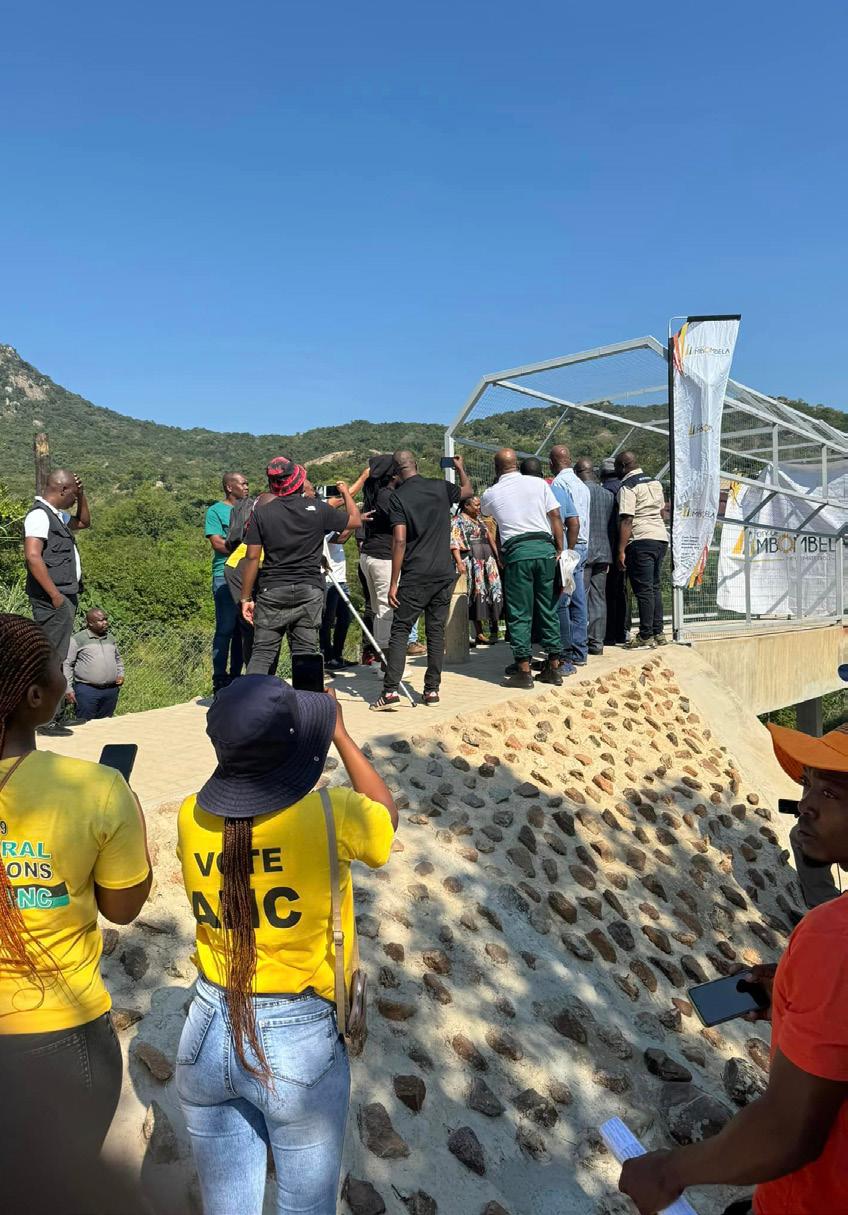
The City of Mbombela Municipality Mayor Sibongile Makushe-Mazibuko is hard at work delivering services as per the mandate given to the City by its citizens.
Shoppers can also be spoiled for choice between Matlosana Mall, City Mall, Flamwood Walk Shopping Mall, Tower Mall and other leading shopping centres in Matlosana.
The handover of projects emanates from the service delivery enhancement program that stemmed from the Mayoral Imbizo.
“The imbizo enhanced service delivery enormously, and as a result, the City is ready to hand over quite a number of projects from April until the midyear,” stated the Mayor.
In April the Honourable Mayor handed over three completed projects to the
communities of Mganduzweni and Jerusalem in the Northen Region of the city as part of the Integrated Development Plan (IDP) process.
The three projects include a 52.6m foot bridge in Mganduzwenu, the Khulani 23m pedestrian bridge in Jerusalem, and a State-of-the-Art Community Hall built in Jerusalem.
The Executive Mayor said that the bridges had brought much needed relief to the communities who had seen their children crossing the waters of raging streams during the rainy season and risking their lives because of imminent snake bites in the bushes on their way to school.
Agriculture is one of the mainstays of Matlosana, which proudly boasts a region rich with agricultural potential.
The Executive Mayor further stated that the construction of the Khulani pedestrian bridge, addressed the challenge of the temporary slippery wooden bridge installed by community members to mitigate the challenge of crossing the flooding stream during heavy rains.
The emphasis is focused on field crops, such as maize, wheat, sorghum, sunflowers, etc...
The Mayor stated that children will now be able to attend school during heavy rains, and the community would now be able to cross the stream from Maswazini to Khulani block safely and with ease.
Speaking of the State-of-the-Art Community Hall, the Executive Mayor mentioned that not only were many jobs created during the construction phase, but the newly constructed hall will now bring an end to meetings and events being held at schools and under trees.
The community hall has a capacity of 600 people, with a boardroom and a kitchen to mention just a few of its amenities.
The Mayor made a special appeal to


the communities to guard these assets jealously. "Those who destroy public property are doing great disservice to you as communities as you suffer the consequences of their selfish actions. It will be a very sad day to see so much investment fall prey to selfish individuals." she concluded.
In May the Mayor, together with the CoGTA MEC, Mandla Msibi, led a team of Councillors and community members during the official opening and handover of the new roads to the citizens of Pienaar.
The new roads that stretch over a combined 4km, were constructed and handed over in record time to elevate the state of the fast-growing township.
The Market is the property of the City of Matlosana and was established in 1980 and it is ranked 8th out of 17 Fresh Markets in the country according to turnover.
Makushe-Mazibuko said she was impressed by both the contractors and community members for creating a conducive environment for work to be done without any challenges and hiccups, as witnessed in other parts of the province.
With five Market agents, the market supplies customers as far as Botswana, Kimberly and Vryburg.
“We shall not dare fail in this mandate to provide all our communities with better services they so deserve,” says the Executive Mayor.
DETAILS
Address: Cnr Braamfisher & OR Tambo Streets, Klerksdorp
018 487 8000/ 018 487 8800
communications@ klerksdorp.org
“We are continuing with our work of delivering services as mandated by the people of Mbombela….and that is a sign that as a municipality we are forever on the ground, working.” - Mayor Sibongile Makushe-Mazibuko


The Sundays River Valley Municipality (SRVM) has been announced as the Eastern Cape’s Greenest Municipality for the year 2023/24 and has been awarded R500 000 cash prize.
It is the Transformation of the N12 Treasure Route that has unlocked regional opportunities and resulted in massive activity and mobility along the Matlosana portion of the corridor. It has a multi-dimensional character that has created employment, enhanced commuter movement, enhanced investment opportunities, increased economic activity, etc.
WHY VISIT THE CITY OF MATLOSANA?
This was after the citrus-rich municipality was announced as the Greenest Municipality in the Sarah Baartman District Municipality last year and was awarded R50 000 and a spot in the provincial competition. SRVM also placed 2nd in the local municipality category at the 2022 National Arbor City Awards and brought home a cash prize of R300 000.
Create unforgettable memories at our quality business and leisure accommodation venues which include conferencing, wedding and spa facilities. The City has a wealth of attractions for visitors:
The greenest municipality competition comes about through a call from the District Municipality and the Department of Economic Development, Environmental Affairs and Tourism (DEDEAT) for the Provincial competition.
• Adventure tourism
• Wildlife tourism
• Medical tourism
that constitute the environmental management ecosystem. These include overall strategy, environmental sustainability, tree planting, awareness and maintenance, policies in place, public facilities, open space management, recycling, awareness, energy efficiency measures, water quality management and other elements which the department deems important.
According to (DEDEAT), the Greenest Municipality Awards are held annually to recognize attempts and efforts performed by municipalities to build capacity, raise awareness, and sustain best practices around waste management and environmental management at large and eliminate the risks caused by pollution to human health and the environment.
Speaking after receiving the news, the Mayor of SRVM, Cllr. Solethu Lucas, said the R500 000 cash reward will go far in assisting with the funding of the municipality’s greening, cleaning, and environmental conservation initiatives.
Create unforgettable memories at our quality business and leisure accommodation venues which include conferencing, wedding and spa facilities.
MATLOSANA AS A MEDICAL HUB
“As we celebrate 30 years of democracy in 2024, we are dedicating the funds to a special 30 Green Deeds for 30 Years of Democracy programme which encapsulates several activities directed towards better awareness, greening, tree planting, maintenance, and eradication of alien species,” he added.
spaces, and rehabilitation of illegal waste disposal sites.
“As Sundays River Valley we are proud of the partnerships we have. We have seen our local businesses supporting our initiatives with personnel and other resources towards the shared vision of a greener and cleaner Valley,” he continued.
“We appreciate all the support we have received from our stakeholders and residents who have joined hands with us to play their part in our #keepsrvmcleanAndgreen Campaign,” he added.
Speaking on the municipalitie's future and goals, Municipal Manager Mr Thabiso Klaas said the municipality will focus on strengthening the recycling business component, capacitating waste collectors, linking them with markets and treating the work they do like any other business, creating opportunities and promoting the Reduce, Reuse and Recycle system.
“We are looking at getting every community member buying into energy efficiency methods at a household level,” he said.
The city prides itself on having five private hospitals, two government hospitals, including the largest state hospital in the North West Province and 15 clinics including mobile clinics. It also boasts the only fully contained oncology unit in the North West Province, which offers a comprehensive service at four pathological laboratories and has the latest MRI scanner at the radiology unit.
• Wellness tourism
Municipalities participate by completing an entry form and providing a portfolio of evidence looking at several aspects
To us health care is of paramount importance as a healthy city is productive and constitutes prosperity. We boast well-developed medical facilities, which enhances and promotes the competitive advantage of Matlosana as a major Medical Hub in the North West Province. Services include: general and private medical fascilities, casualty/trauma and dental services. Most clinics focus on primary health care services.
The municipality has partnered with the relevant government departments, civil society, business, schools, and farming community, to coordinate programmes to equip residents with information around recycling, educate them about the importance of greening and environmental conservation, tree planting, beautification of
"The goal for the municipality is to see a 100% implemented strategy, and take lessons learned into the new strategy, with an end-goal to see everyone, from parents to kids adopting a green lifestyle."
- Mayor, Cllr. Solethu Lucas
N12 Development Route was identified by the municipality as a flagship project for golden opportunities in the following sectors: housing, business, industrial, heritage, mining, tourism, sport as well as recreation.


Processes
Systems
Data Technology

In South Africa and communities worldwide, the need for robust road infrastructure is more critical than ever. At Komatsu, we acknowledge these challenges: we are actively working to overcome them.
As a leading manufacturer and supplier of capital equipment for the construction and mining industry we are committed to providing more than just machinery. We are dedicated to creating a sustainable future where people, businesses and our planet thrive together.
Through manufacturing and technology innovation, we harness the power of our collective expertise to address South Africa’s road infrastructure needs and beyond.